#but I think the ultimate takeaway from it is when it points out how difficult it would be to make any of this actionable
Explore tagged Tumblr posts
Text
On March 20, for the second time in its history, the United Nations Security Council (UNSC) convened an Arria-formula meeting that focused specifically on the integration of the human rights of LGBTI+ (lesbian, gay, bisexual, transgender, intersex, and other sexual and gender minorities) people in conflict into the work of the council.
Arria-formula meetings are informal, ad hoc gatherings that allow the convening member to invite parties outside the council’s membership to testify. The session’s chairperson, U.S. Ambassador to the U.N. Linda Thomas-Greenfield, stressed that this was the first time that Victor Madrigal-Borloz, the U.N. independent expert on sexual orientation and gender identity, had briefed the Security Council.
The significance of a Security Council meeting on LGBTI+ issues is not to be underplayed. Madrigal-Borloz and his office have created significant momentum since receiving the mandate to investigate these issues in 2016. The mandate has proved an important tool for engaging with national and local LGBTI+ civil society organizations, gathering on-ground insight during country visits about experiences of peace and conflict that have previously been absent from these international conversations. The U.N.’s most conservative organ is now moving toward entrenching and mainstreaming the protection of queer people as a mainstay of peace and security policymaking globally, as well as integrating attention to sexual orientation and gender identity in its work moving forward.
But there are still difficult questions around the future course of such measures. Is going down the UNSC route the right way to ensure the protection of queer people? How can the council ensure not just participation, but also leadership for deciding the next steps for international action from those outside the global north? How can actions account for the many diverse populations within the wide community of LGBTI+ people as a part of not only rethinking security responses, but also thinking about gender as a dimension of peacebuilding? What is the role that the broader U.N. LGBTI Core Group will take in bringing forward this agenda?
Speaking before the meeting, Thomas-Greenfield stated her desire to see momentum build toward the formal inclusion of LGBTI+ issues on the agenda. The potential integration of these issues and queer perspectives into future Security Council work could establish a UNSC-level mandate for the protection of queer communities.
We do not dispute that it is the UNSC’s responsibility to protect queer people globally. Indeed, we have each individually argued—in research on queering atrocity prevention and the responsibility to protect, and queering the women, peace and security agenda, as well as at the Arria-formula meeting—that the integration of queer people and perspectives into frameworks for peace and security is essential. For us, queering means not only highlighting the insecurity some people face because their gender and/or sexuality is constituted as abnormal or perverse by cisheteronormative standards, but also adhering to a queer political commitment of always interrogating dominant power structures and examining who benefits from the status quo. All people have a sexual orientation and gender identity. All people should, therefore, already fall under the work the council does to ensure international peace and security—regardless of their identity.
What troubles us, however, is that the United States and United Kingdom are leading the integration of LGBTI+ issues in the work of the UNSC while their domestic situations for queer people, especially transgender folks, are becoming increasingly fragile.
In the United States, there are an increasing number of legislative moves against queer people. Targeted legislation against the community includes what critics call the Don’t Say Gay law and the Stop WOKE Act, both passed in Florida and promoted vocally by Republican Gov. Ron DeSantis, as well as the rollback of federal guarantees for reproductive rights with the repeal of Roe v. Wade.
In the United Kingdom, reported violence against queer people doubled between 2016 and 2021. And the country has been seized by a narrative of transphobic panic pushed by both mainstream media and politicians of both parties, resulting in the U.K. government’s halting of nationwide reforms of legal gender recognition as well as the blocking of Scottish reforms to the Gender Recognition Act, despite broad support for reform amongst the public. In his end of mission statement following his U.K. country visit, Madrigal-Borloz stated that he has a “deep concern�� about the rise in anti-LGBT harassment, threats, and violence in the country.
Most worryingly, even with the worsening U.S. and U.K. domestic records and international virtue-signaling on queer issues, many other countries—including fellow Security Council members—have adopted anti-queer politics in nationalist discourse and as a key feature of their challenge to liberal world order. Russia has marketed itself as the world’s defender of so-called traditional family values for more than a decade, positioning itself in opposition to Europe, which it has constituted as “Gayropa” in its foreign policy. Part of that foreign policy includes a gendered and sexualized element, in which Russia presents itself as the savior of the morally corrupt Gayropa. Promoting so-called traditional values in opposition to supporting LGBTI+ rights was also a remarkably successful tactic in Colombia leading up to the failed peace referendum in 2016, and the appeal of such values is gaining further international support.
In China, there are no explicit legal protections against discrimination or violence on the basis of sexual orientation or gender identity. Increasingly, groups that were established to support the LGBTI+ community are targeted and censored by the state, and there has been a resurgence in the propagation of the idea of queerness as correctable and foreign. This accompanies a shrinking space for advocacy, as the state’s censorship and security apparatus explicitly targets any positive queer representation and discourse. This has included a systematic campaign to eliminate “effeminate” men (niangpao) from mainstream media.
In Europe, countries such as Hungary and Poland have passed legislation that paints queer people as dangerous threats to order and the fabric of society. As we see the political currency of so-called traditional family values spread and harden internationally—along with a growing resistance to the imposition of “Western” queer values, Gayropean values, or so-called woke agendas—the UNSC adopting a queer agenda risks whipping up existing tensions about sexual morality, tradition, and culture in human rights debates, and adding fuel to the increasing attack on LGBTI+ people that is already underway.
Taking all of this together means that proponents of a queer agenda in peace and security chart a very cautious path forward when considering positioning the UNSC as a defender of queer people. Russia, a state actively perpetuating a discourse about the threat that queerness poses to international order and so-called tradition, and the United States and United Kingdom, states where there is significant and increasing polarization on LGBTI+ issues and gender more broadly, sit as permanent members of the UNSC. That means that there are huge risks in how Western, highly militarized states approach this move to, as Thomas-Greenfield put it, “institutionalize and regularize the Security Council’s approach to LGBTI+ issues.”
The often broad-strokes nature of UNSC resolutions leaves little room for the social and political nuance that is important when responding to queer people’s vulnerabilities. As such, a focus on the role of the UNSC, to some states and civil society actors, may end up reading as the imposition of Western values; an argument that already has incredible discursive traction among homophobic actors and often violent consequences for those targeted by anti-queer violence.
UNSC-led initiatives may also serve ends that are antithetical to its initial purpose: namely, justifying interventionism in a similar way to other interventions motivated to protect against gendered harms, such as the post-9/11 invasion of Afghanistan that was clad in colonial tropes concerning the subordination of Afghan women.
Language that dehumanizes and instills fear can quickly spread from traditional and social media, leading to the escalation of violence based on identity. Past instances of atrocity crimes, such as those perpetrated by the Nazis and those that drove the disintegration of former Yugoslavia, demonstrate that the persecution of LGBTI+ individuals and queer communities frequently serves as a precursor to the persecution of other marginalized groups. Lessons can be learned from organisations such as Colombia Diversa, which documented the integration of LGBTI+ folks in the Colombia peace process and is leading the way on queer approaches to peace and security.
Other research informed by LGBTI+ people working in conflict-affected societies can guide these next steps. The aforementioned study on queering atrocity prevention, funded by the U.K. government, called on states to engage in LGBTI+ inclusion and protection first and foremost at a domestic level and in a bottom-up, context-sensitive way, rather than adopting resolutions that may inadvertently make certain queer people in certain spaces more insecure and subject to targeting for persecution or eradication by actors seeking to use homophobia and transphobia for political gain.
A 2022 report titled Breaking the Binary, also funded by the U.K. government, recommended including LGBTI+ rights in national action plans; facilitating gender sensitivity training for international donors, international agencies, and civil society; developing LGBTI+ inclusive risk indicators and monitoring systems; investing in locally rooted organizations doing work to challenge heteropatriarchal gender norms and values; broadening the definition of “woman” used in Security Council resolutions 1325 and 1820; and undertaking “joint internal learning, planning and implementation across different teams working on LGBT+ rights, on the WPS [women, peace, and security] agenda, and on conflict.”
We see the greatest opportunity for success in the building of contextually sensitive and less broad-stroke approaches to queering peace and security by working through the U.N. Human Rights Council and the Joint Office for the Prevention of Genocide and the Responsibility to Protect. These U.N. organs are well-placed to work with states and local partners to build devolved mechanisms to protect queer people whose needs differ over space and time.
With a new independent expert taking up the mandate in October 2023, we urge them to make an unflinching effort to integrate queer people, queer perspectives, and LGBTI+ rights into peace and security practices, particularly through the aforementioned U.N. organs, but also through the Peacebuilding Support Office.
#I thought this article was interesting#but I think the ultimate takeaway from it is when it points out how difficult it would be to make any of this actionable#also girl the UN has historically failed to protect a lot of people even with more support and impetus and focus
0 notes
Text
I'm wondering how much of the fandom reaction of "Aziraphale doesn't ACTUALLY want Crowley to be an angel, he just wants to keep him safe/happy!" is because we spent four years between seasons assuming that Aziraphale had already accepted that Heaven and Hell aren't all that different, and that demons and angels aren't inherently good or bad. And it's difficult to let go of that idea in the same way that it's difficult to let go of the idea that they talked their shit out That Night At Crowley's Flat and have been happy ever since. But to actually understand Aziraphale's choice without hiding it behind coffee or lies or secret plans or body swaps or magic tricks or purely romantic intentions, we have to to understand that Aziraphale is still working under an incorrect framework of the world as divided into Cosmic Good and Cosmic Evil.
Because the thing is. Aziraphale does not like that Crowley is a demon. He just doesn't. We can talk about his reasons, but I really don't think that it's a disputable fact at this point. Aziraphale CONSTANTLY talks down to Crowley about the differences between them, and disparages demons in general and Crowley in particular over and over again. I mean, he's obviously just spewing the party line at this point, but he even describes the ultimate triumph of Heaven over Hell as "rather lovely." To Crowley. Where does he think Crowley fits, in that scenario? Is he thinking about it? (He is, surely, given how distressed he is over the danger Crowley is in due to the Arrangement?)
Crowley, to be fair, often says similar things about himself, and hates when Aziraphale calls him things like 'nice.' But as I've mentioned in another post, I think 2.03 makes it all but canon that a lot of that is self-preservation. Hell can't know that he's running around saving children and rescuing people from suicide and poverty, or he'll get dragged down there for decades. Crowley doesn't really think of himself as evil--he's visibly upset during their argument when Aziraphale hits him with "you're the bad guys!" because he thinks Aziraphale knows him better than that.
But instead, Aziraphale makes knee-jerk assumptions about Crowley and his intentions over and over again, including that he's behind the Reign of Terror in Paris and, about two minutes before realizing he's in love with him, that he's working with Nazis. Crowley seems annoyed and hurt both times, and denies it. There's no demonic posturing from him then.
Which makes the Job ep really interesting, right? Because Crowley actively lies and says that he is doing the properly demonic thing, but Aziraphale doesn't buy it. And why doesn't he buy it?
"I know the angel you were."
To Aziraphale, Crowley's kindness stems from the traces of that angel he knew. He thinks Crowley does good in spite of his nature, and not because of who he is as a person, life experiences as a demon very much included. This is because to Aziraphale, Heaven is Good, and all goodness must stem from it.
I've seen people get accused, when making this point, of attacking Aziraphale, or saying that he doesn't love Crowley, which is a ridiculous takeaway from S2. I've never seen a person more obviously in love, or a person more obviously trying to do good in the world. But so much of Aziraphale is tied up in his ability to believe multiple contradictory things at once. (See: the 80 years between "maybe there is something to be said for shades of gray" and "Heaven is the side of truth, of light, of good.") That doesn't make him stupid or ill-intentioned (in fact, he wouldn't need to do the kind of mental gymnastics we see from him if he wasn't clever enough to see through at least some of the bullshit) but it does mean that he's fully capable of loving Crowley while at the same time believing that demons are 'the bad guys.' Solution? Make Crowley an angel. Fix him, fix the bad apples in Heaven, be happy together, eliminate human suffering. Vavoom. Sorted.
Idk man. I'm constantly seeing takes that just...completely discount that Aziraphale really, genuinely, has misunderstood Crowley and the way the world works in his choice to return to Heaven. We can't blame it all on miscommunication. The most honest conversation in the world wouldn't fix this. Aziraphale has to go up there, without Crowley, and learn for the last time that Heaven is not Good, and will never be Good, because there is no Good. Good doesn't come from Heaven, or God, or even Crowley (and I see y'all, putting Crowley on a pedestal, saying Aziraphale wants to remake Heaven in his image--stop it.) Good comes from making the choice, in a very complicated world, to help as best you can, and it comes from love. And that's what Aziraphale will learn in season 3.
#good omens#good omens meta#good omens season 2#aziraphale#gos2 spoilers#long post#sorry about the paragraphs of meta every couple of days. I'm still unwell about it all.#this will be the last one. maybe. who can say
789 notes
·
View notes
Note
Why do you call your cat piss king? Is he really good at it or something?
hi anon!
we're gonna learn a bit about cat urinary systems and issues! it may be a bit TMI for the scope of the question but, given how few cat guardians know about this, I'm always looking for chances to educate since being informed can literally save a cat's life.
the main takeaway: if you notice that your cat cannot pee, HEAD TO THE EMERGENCY VET NOW, DO NOT PASS GO! full stop.
if they cannot pee, that is one of the few true emergencies in a healthy cat, and you NEED to treat it as such.
usually you'll see a blocked cat straining and vocalizing in the box, licking themselves, whining and highly reactive to being touched on the lower belly, and - of course - you won't see any proper urine in the box. there may be dribbles or blood, but no pee. this is a problem that escalates really fast, and can easily be lethal. do NOT fuck around with it.
what qualifies me to talk about this? it's exactly what happened to pekoe (peek for short) about three years ago.
proper Storytime and more detail below the cut.
see, the thing with cats is that their bladders are tiny and their kidneys are, uh, bad! so if they can't pee, not only is it incredibly painful, but the liquid and toxins building up in their system can do a LOT of organ damage in a VERY short amount of time. this can get very bad, very fast, and it is very easy for them to die from it if the issue can't be fixed easily and promptly.
usually, the vet will be able to get a catheter into the blocked cat to relieve the pressure, flush out their bladder if there's a physical blockage (ex, if they've made bladder crystals/stones, we gotta get those out of there!), and give them medication to prevent spasms and infection as they heal. a cat then needs to go on urinary-friendly food to prevent additional blockages for the rest of their lives, and some other lifestyle adjustments should be made to treat any underlying risk factors that the animal might have.
sometimes, however, that doesn't resolve the issue, and they block again. and if you're extra unlucky, they'll block AGAIN after that. and maybe again, for extra spice. if you're extra extra unlucky, this will all happen in the same week.
this is the situation that peek and i found ourselves in.

picture the urinary system of a cat as a funnel, with the external bits being the tip of the funnel. when you ultimately need to make a funnel bigger because it can't drain anymore, what do you do?
you remove the tip.
this is an operation called a perineal urethrostomy, or a PU for short. it's a last resort salvage procedure that essentially removes the external genitalia of a male cat to widen the exit of the urinary tract and prevent future blockages. it's a difficult and delicate operation with a very long recovery time. it was also the only option left to save peek's life.
real talk before this next bit: i will never judge pet guardians for impossible decisions made in good faith based on qualified medical advice, in the interest of trying to do what's best for their pets. flat up, i don't stand for that shit.
okay? cool, let's keep going.
a PU is definitely not a surgery that has any guarantees, it can be very painful, it needs a very skilled vet to do it, and it's both expensive and difficult to see an animal through it safely. it was also the one option we had left to save peek, who was very very VERY sick at that point. the vet told me that she was also willing to do euthanasia, if the PU was not right for us, with zero judgment - the little guy had been through a lot of pain and several surgeries already, and doing this operation would be asking a lot more from an animal that was already very weak, with no guarantees of success.
he was briefly stable so i took him home to think about it and sat with him overnight. hours in the darkened living room, with my fluffy best friend sleeping fitfully in my arms like a sick baby. in the morning when he woke up he gave me a little lick on the face, and then a headbutt with a weak but undeniably hungry little meow. he hadn't had an appetite in a week, but now he wanted breakfast. in that moment, i knew he was letting me know that he wasn't finished fighting yet, so i knew the right decision for me was to keep fighting for him.
i called the vet, and we went ahead with the surgery.
i'll spare you the rest of the grisly details - the procedure was a success, and i was lucky enough to be able to work remotely and nurse him through the recovery. it was long and difficult and stressful. it sucked! it was crazy making. i would break down weeping with relief every single time i saw a dirty litter box for WEEKS. if you're reading this and going through it yourself, please feel free to reach out to me any time, okay?
but we persevered. i took care of him, and he rallied like a goddamn king. and hey. anon. guess what?
that was almost three years ago. his life went fully back to normal after he healed. you wouldn't know that this had happened if you didn't already know, because that fluffy little king still pisses like a champion race horse.

so, that's the story of how pekoe became
THE PISS KING.
#pekoe the piss king#storytime#anon ask#cw pet death#cw surgery#cat care#cat owner psa#psa#urinary obstruction#pu surgery
40 notes
·
View notes
Text
Spirk Meta: Connecting Star Trek SNW & TOS
I'm going to try to connect TOS and SNW's character arcs for Kirk and Spock's relationship with one another. This is part analysis and part prediction of where the writers are headed in shaping SNW into the TOS narrative.
With the most recent SNW episode, I think it's really fascinating that Spock is coping with the consequences of his attraction to Chapel and infidelity to T'Pring, while Kirk reacts to his attraction to La'an by showing a strong sense of loyalty to Carol.
I've been discussing with friends and they believe the two situations aren't comparable. However, I believe they're not only comparable, the writers completely intended them to be compared.
Spock has always served as a foil to Kirk. If you've seen TOS, you know this is true. Spock is logical, Kirk is unpredictable, and so forth. I don't really need to go into details about this, it's been explained to death. For me, it says a lot that in SNW E9, Spock is uncertain of who he is as a person and Kirk is uncertain of who he's meant to become as a commander.
Kirk has his mind on command, hence his discussion with Una, where he concludes that he needs to connect with people. That's the point of that song. Meanwhile, Spock's takeaway from his song is that he needs to specifically stop connecting with others on a personal level because it was a mistake to do so. It's a very internal-facing narrative, as it should be. But as we know, it doesn't work out that easy. For either of them. Ultimately, Spock does connect to people and finds himself emotionally compromised, and Kirk has trouble getting close to others. But Kirk is looking outward for answers, to other people, while Spock looks inward. To me, this extends to how they cope with difficult relationships, problems, and each other.
Kirk, like Spock, is attracted to someone he's not in a relationship with in this season. He clearly feels something with La'an but explicitly chooses not to pursue it seriously because he's in a relationship (some of the time) with Carol Marcus, who is having his child. Spock, on the other hand, says he wants to feel at this time. He doesn't want to let his relationship get in the way of experiencing something new with Christine Chapel, even at the detriment of his core beliefs. The really interesting thing about this is that these two characters arrive at the same conclusion even by making different choices. They both end up incredibly lonely, a major thematic arc for both men throughout TOS.
How they react at these crucial moments in SNW is a representation of their priorities in relationships, in life, and how they even become with one another. Kirk is married to the idea of command, costing him his relationships to other people. Spock is so deeply internally focused that he only has a few real friends by the time TOS rolls around, and can't accept that he cares about them, always couching it in terms of duty and obligation.
Spock essentially thinks, I need to not get close to people because I'll be hurt by those people. Kirk thinks, I need to get close to people where it matters, for command, but not so close that I'll hurt them. This ends up with both of them being painfully reticent to connect with anyone, to the point where in The Final Frontier, Kirk thinks he has no family.
MCCOY: It's a mystery what draws us together. All that time in space getting on each other's nerves and what do we do when shore leave comes along? We spend it together. Other people have families.
KIRK: Other people, Bones. Not us.
He eventually changes his mind by the end of the film, but you can see that this theme of loneliness goes all the way from SNW to nearly the end of their lives. Kirk's conclusion at the end of the film is that McCoy and Spock are his family.
But we see this idea of loneliness repeat so often that Kirk has a several ex girlfriends in TOS show up, all on good terms with him except one who we won't talk about here. Spock, on the other hand, has mostly closed himself off to relationships of all kinds by TOS, even shaming himself for whatever it is he actually feels for Jim, who is his best friend at that point. And they both fight this loneliness aggressively in TOS and the films. Spock insists he feels shame for his friendship with Kirk, Kirk feels like his ship owns him and he can't have anyone in his life. This excerpt from The Naked Time, which I abridged significantly since there was a lot of interspersed discussion about physics, is revealing:
SPOCK: My mother. I could never tell her I loved her. An Earth woman, living on a planet where love, emotion, is bad taste. I respected my father, our customs. I was ashamed of my Earth blood. Jim, when I feel friendship for you, I'm ashamed. Understand, Jim. I've spent a whole lifetime learning to hide my feelings. KIRK: I've got it, the disease. Love. You're better off without it, and I'm better off without mine. This vessel, I give, she takes. She won't permit me my life. I've got to live hers. I have a beautiful yeoman. Have you noticed her, Mister Spock? You're allowed to notice her. The Captain's not permitted. Now I know why it's called she. Flesh woman to touch, to hold. A beach to walk on. A few days, no braid on my shoulder.
They're both completely focused on their inability to love people. Spock is focused on talking about how he can't because of his identity, and Kirk is talking about how he can't because of his job. We even see Spock turn down an appeal from Chapel, as Chapel turns him down here. These two episodes have major parallels.
Just like in Subspace Rhapsody, Spock is thinking of himself, his faults, his issues, and Kirk is thinking about how he never stays in one place long enough to love someone. I think this sense of inability to experience deep love is actually setting up their friendship arc. Obviously, they eventually do love each other (in some way or the other). But it begins at what is clearly friendship, and notably, Kirk is eventually able to look past his marriage to command for Spock, and Spock is able to look past his reticence to relationships for Kirk (see Amok Time).
What's of interest to me is that we don't know how Spock and Kirk become close in the first place, but we will. It's clear they're very close friends by TOS, but in SNW currently, we haven't got an inkling of how that forms. My take on it is that it forms because of their respective struggles to connect with people. They're both struggling in precisely the same way: neither of them thinks they can or should get too close to people. For one another, they act as the only person they're able to completely let their guard down with. And that's possibly how they get close; that's the basis on which their relationship forms. They trust each other. Because they think they're not allowed to have or experience love, they end up more or less using one another as a stand-in for that need. In doing so, it brings us full circle. Kirk and Carol have a conversation about their relationship briefly in The Wrath of Khan.
KIRK: I did what you wanted. I stayed away. Why didn't you tell him? CAROL: How can you ask me that? Were we together? Were we going to be? You had your world and I had mine. And I wanted him in mine, not chasing through the universe with his father. Actually, he's a lot like you. In many ways. Please tell me what you're feeling. KIRK: There's a man out there I haven't seen in fifteen years who's trying to kill me. You show me a son that'd be happy to help him. My son. My life that could have been, and wasn't. And what am I feeling? Old. Worn out.
Kirk is terrified of aging. In this film, his past has come knocking, the same past SNW is exploring now. He's terrified of growing old and he's terrified he made the wrong decision when he was younger. I'd argue that that's because it's led to him feeling deeply alone, to the point where McCoy says they're treating his birthday like a funeral. Kirk not only feels like he belongs out in space because it's where he's meant to be, but because he doesn't feel so deeply alone, so much like a fish out of water, when he's out there adventuring. So he second guesses himself here: what have my choices cost me? Should I have not gone on to become who I am?
And the answer to that for him is no. This all ties together when Spock dies to save the ship at the end of this film. It's only in a few places in TOS and then finally here where Spock is able to talk openly about friendship and love:
SPOCK: I have been and always shall be your friend. Live long and prosper.
Kirk is devastated but while grieving, he can't help but feel young. And even then, feeling young isn't enough, because he can't stand not being in control, which we see in the next several films. He essentially can't handle life without command or without Spock.
SNW is attempting to bring us full circle on The Wrath of Khan and its cast. I guess what I'm trying to say here is that the character arcs we will eventually be given by the writers of SNW between Kirk and Spock is completely bookended by their feelings of loneliness, self doubt, and connection with others beginning from this episode through the TOS films. It's extremely interesting that they choose to do this on the SNW end by showing us where Kirk and Spock are both failing in their respective relationships with others and how they grow into that with one another, only to experience violent ups and downs throughout the films as they finally try to come to terms with who they really are as people, and who they really are as friends.
I'm interested to see how that will begin from season 3 onwards.
#star trek#strange new worlds#star trek strange new worlds#st snw#st: snw#snw season 2#snw#star trek tos#st tos#tos#mr spock#spock#kirk x spock#spock/kirk#jim kirk#james t kirk#james kirk#star trek the original series#Spirk#space husbands#la'an noonien singh#christine chapel#subspace rhapsody#k/s#the premise
148 notes
·
View notes
Text
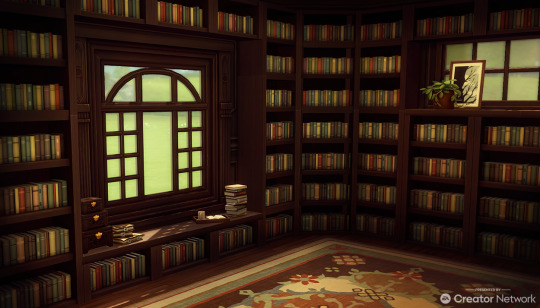
Thank you to the EA Creator network for the code to check out the Book Nook Kit. I haven't had the time I want lately to play and build in ts4 that I would like but I really wanted to take some time to do a quick little cc-free set-type build cc-free with this new Kit since I uh very much love building libraries.
Further review of my quick look at the pack under the cut if you're interested - but my main takeaway is that I'm underwhelmed with the color swatches for the bookshelves and I should, as such, note that the colors in my screenshot above have been adjusted.
I really really wanted to like this Kit so much. The initial promo images didn't inspire me (at all) libraries are one of my favorite things to build in ts4, and I was really hoping the items in this pack could replace some of the CC that I use. That will almost definitely not be the case, however.
My main gripe is with the bookshelves. I enjoyed some of the clutter items and will never turn down a good stack of books, though I do have to admit i didn't look too closely at the other large furniture items because they simply don't fit the style in which I tend to build. The shelves, however, came kind of close to being what I had hoped, but ultimately there's just too many small things that bug me about them that I don't see them being worth the cost of the pack.
Those issues with the shelves were: 1) The snapping - I'm really not into this trend of wall items snapping. If you're someone who really likes to finesse positioning I think you'll probably understand how difficult this becomes with snapped items. TOOL alleviates some of these issues but TOOL should not be a necessity for paid packs (and also bugged out when i was trying to move a piece not on the wall, so maybe a moot point, altogether ¯\_(ツ)_/¯ ). I've also only just noticed that I kept the book swatches all the same because I kept having to replace them to fix placement issues and obviously forgot to adjust that. Oops! :')
2) No base - The shelves just look, to me, so awkward and off without a base for them to sit on the floor. If you look at most shelves of this type, like Ikea's billy bookcases which these have a very similar vibe to, the bottom shelf does not sit directly on the floor, but is instead slightly elevated off of it:

Like, I understand that removing that element from the equation makes the stacking/snapping effect easier to pull off, but :///
3) The Color Swatches - I didn't check 100%, but I think the swatches do match up to The Immaculate base game display shelf which is nice. But just ughhhhhhhh. I really hated the wood colors on these. They all felt cold and institutional. I really wanted there to be a warm mahogany-esque swatch for good dark academia vibes but, alas. For full transparency this is my image before I photoshopped the colors to be closer to the vibe that I wanted:


Before-> After. It wasn't the absolute worst and got some of the vibes I wanted, but also like. meh.
All in all, this kit was a bit of a disappointment to me. I can see some of my issues being fixed with recolors - but at that point I might as well just be using other CC items?? I'll also recommend some of my current favorite bookshelf items I have in my game > These bookshelves by MLys - these basically never ever leave my game even when I'm going super CC-light. > and this modular library set by SSTS (which admittedly has some of my same issues with snapping items in ts4 - but it's free and has seriously BEAUTIFUL swatches and details and so. I cannot complain even the smallest single bit. It's gorgeous and I can only hope to one day build a library worthy of the set, lol)
34 notes
·
View notes
Text
CSH, Identity, & Change (800 words)
A while ago, I saw a post on r/CSHfans asking what it means to write about deeply personal or private things – how that can shape our relationship to someone else’s art and what regrets an artist might have because of this. I came up with this huge response from the lens of a master’s student (read: huge nerd) studying celebrity persona and authenticity, particularly how those components can create community and identification within musical subcultures. I felt like I didn’t really capture the essence of the question – my response sounds more like formal writing than anything else – but I wanted to share here just in case anyone might be interested in my rambling opinion piece.
Car Seat Headrest piqued my interest first because the music is just amazing (what other band would let me listen to a furry monologuing about weird sex for 5 minutes straight), then because I think the relationship between Will Toledo, his personal thoughts and experiences, and the public is an interesting one. The contents of Twin Fantasy are deeply personal; we hear Will sing about an idealized, but ultimately harmful relationship, the fantasy he’s created of his partner, and his struggles with being queer. For a lot of listeners, myself included, his self-disclosure in this album is part of what makes it great. The ideas we gather about who Will is and what he’s gone through guide our own interpretations of the music and form the basis for a fan culture that’s sprung up around CSH (See: Hansen).
But when you reach Will Toledo’s level of fame, it gets more difficult to navigate opening up about your private life. Your experiences are no longer purely your own; they’re left to the interpretation, analysis, and re-imagining of the general public. Will has expressed frustration with how personal narratives in TF have been interpreted, calling out a Rolling Stone writer for disseminating “a weird, gross, inaccurate representation of [his] personal life” (See: New York Times), and seems to be pulling back from the open approach of his earlier albums (the newest CSH drop is literally called Making a Door Less Open).
From an audience perspective, it seems like TF Face-to-Face might’ve been a turning point for Will, as nearly all his original works produced since then (with the exception of MADLO) have been from his jokey EDM side-project, 1 Trait Danger. With three concept albums out to date, the music of 1TD doesn’t follow the personal thoughts or actions of Will, but rather the fictional high-school antics of characters including Stoney Bologna, Cossett the bitcoin-stealing bully, and a derisive caricature of journalist Tim Schenectady. 1TD members Will and Andrew even perform as two of their characters (1 Trait and Stoney Bologna respectively), causing them to walk the line between musicians and character actors.
You can clearly see the influence of 1TD on CSH’s 2020 album, Making a Door Less Open. I mean, come on – Will performs MADLO as Trait, an extremely recognizable bunny thing wearing a gas mask and neon orange jumpsuit. From the criticisms I’ve seen of MADLO, it seems that some people perceive the lyrical content as vapid or gimmicky, Trait as a redundant alter-ego of Will himself, and the project as a whole as an example of CSH “cannibalizing itself” (see: Pitchfork). But, to relate this to your topic, Toledo has clarified that the contents of MADLO/Trait character are meant to “take the focus off Will Toledo for once.” Even though some MADLO entries can be viewed as autobiographical (“Hollywood”), they just don’t provide the same level of personal disclosure as earlier works.
I think a key takeaway from this is that any deeply personal work of art will be subject to audience dissection, analysis, and at times, horribly incorrect interpretation. Will Toledo – who has essentially built his musical brand as intimate and authentic through CSH’s disclosive lyrics – will never be able to prevent audiences from conflating the ‘real Will’ with the idea of Will derived from his music. Because audiences genuinely believe they have access to the ‘real Will,’ the introduction of the Trait character could’ve been an attempt to form a stronger boundary between Will as himself and Will as Car Seat Headrest.
Obviously, posting these 800-some words of speculation make me no different than the rest. I can’t pretend to understand the motivations behind Trait, or MADLO, or Will’s interest in fursuiting (a different, but related, conversation) any more than any other fan of CSH. I just think it’s interesting to examine how Will might be renegotiating his personal disclosure and public persona as time goes on, particularly from an academic standpoint.
If anybody has any related thoughts, please drop a response or DM. I’m super interested in other perspectives on this topic, or even related thoughts on celebrity and fandom identity.
#car seat headrest#emo#essay#question mark?#twin fantasy#1 trait danger#look i was just really feeling the Words this morning okay
4 notes
·
View notes
Note
And, ok, let's entertain the idea for a second that anon is correct. I don't think it's very likely, and the whole idea definitely smacks of classic "it was Bad All Along" revisionism, but ultimately there's no way of really knowing for sure what's going through someone else's head when they sit down at a typewriter, so let's entertain it for a second.
... What is our takeaway from this supposed to be, exactly? That people can create art that seems to be very well-crafted and thought-provoking, to be created with talent and dedication, with only sinister motives in mind? Ok. Depressing thought, but sure, I'll accept that.
So how exactly are we supposed to differentiate between art created with genuinely good intentions or for love of the craft, and art that's created with unsavoury motives in mind? Is there any 100% reliable way to do that? After all, it would be very easy for a predator to intentionally only create art with "wholesome" messages that ostensibly condemns predatory behaviour, in order to make themself seem more trustworthy, and any fiction writer worth their salt is capable of convincingly writing from a perspective that isn't theirs.
And conversely plenty of perfectly decent people with overall good intentions can write something tone-deaf or with questionable implications that they didn't take the time to really think through. But the reverse is true too - people can write stories with positive and "wholesome" messages which they fully believe and try to live by themselves, and sometimes the questionable implications in a piece of work really do reflect the deeply-held values and biases of the creator.
And that takes me to my next point. Frankly, I do not trust people on tumblr (or the internet in general) as a collective to make that kind of judgement call, because it's been repeatedly demonstrated that people on the internet collectively will cherry-pick evidence for the express purpose of painting anything or anyone they personally dislike in the worst possible light, or to gas up and act overly defensive of anyone or anything that they personally like.
There are people who delight in putting on a Sherlock Holmes hat and painstakingly combing the works of a given author under the assumption that they can deduce someone's entire personal life based on their work (or their body language, or the people they're seen leaving the pub with, or anything that seems to back up an existing assumption.) And they might be lucky enough to be proven correct once or twice, but there's a lot of potential to come to entirely wrong conclusions, which can have consequences ranging from just annoying to actively harmful.
People will come to wild, incredibly bad-faith and insubstantiated conclusions based on "vibes", often in ways that are specifically harmful towards certain marginalised groups. Most of us have, at some point or another, seen someone call something "sus" or accuse someone of being "probably a paedophile" based on some petty bullshit or reasoning they made up out of whole cloth. Which, let's be real here, makes it much more difficult when people try to draw attention to actual genuine red flags or real-life allegations, because so many people are sick of hearing "umm it's sus to write about teenagers having feelings when you're an adult" and get into the habit of just tuning out.
So, yeah. I don't think all of NG's actions - including the fiction he wrote - were all part of a nefarious scheme to take advantage of young women. I think that seems like a big reach and denies the possibility that people can have complicated and multifaceted reasons for doing things, and real-life cartoon villains who do everything for Evil Reasons don't exist any more than 100% pure good "unproblematic faves" do. But ultimately think that getting bogged down in speculating over that is a pointless exercise that won't get us anywhere. And "vibes" based on an author's work continue to not be a reliable foolproof way of determining what kind of a person they are, or what they might be capable of.
Don’t hate yourself for liking someone’s works. Something to remember is that Neil Gaiman wrote his stories to target young, vulnerable people. He was writing his stories to attract fans, and interacted with the fans to entice and groom them. Some of his victims met at book signings. All were fans of his books.
The stories were written with your admiration in mind. It’s not your fault he wants to hold the admiration of people of your demographic.
First, I don't.
Second, I think you are making up a story here bro. I think once upon a time there was a teenager in england who worked in journalism but wanted to write books, and then he was the one-in-a-million lucky soul who wrote his books and they became wildly famous and successful. and then after he accrued power and fame he started exploiting it. I'm not saying people who abuse power don't tend to try and get themselves into positions of power, but "famous author" is a pretty difficult career path and one likely to fail.
with this narrative you've concocted, you've removed his humanity from him, as well as any sort of genuine love of storytelling or creation he definitely has. like he's just as human as the rest of us, and I simply do not believe that he is a monster who only cares about attracting 20-something women and does this by crafting beautiful stories for the page and screen.
there's a concept I've talked about before, the Fetishist. as someone with a widely hated fetish, I've thought a lot about how people think people with my fetish are not humans but Fetishists, monsters who look human but only care about fulfilling their fetish, and see all other people as Objects They Can Use or Nothing. you've turned gaiman into the Predator, which is the same thing just a bit broader. the Predator is a monster shaped like a human, but unlike a human who cares about a myriad of things and has a three-dimensional personality, the Predator only cares about Preying On [usually young women or children], and every human being is, to them, either a Target To Prey On or Nothing. neil gaiman is not the Predator because the Predator doesn't exist. I don't think he had a long term plan. I don't think 19yo neil gaiman was going "hehehehe I can't wait until I become world famous so I can use that to coerce women into sleeping with me!"
turning ng into something evil is easy. because then you don't have to think about the good he's done. then you don't have to think about how he's been a supporter of queer people since the 90s. then you don't have to think about how he's supported refugees or ukraine. you don't have to think about his works of tzedakah or tikkun olam, and you don't have to think about the beautiful art he's made (and while we're here, let's think before dehumanizing a jewish man, hm?). it also handily makes it so you never have to worry about your own behaviors. because you're a three-dimensional person! so of course you could never be the Predator. or the Abuser. or the Fetishist. or the Narcissist.
until I see proof debunking this, I am going to continue believing he made the art he wanted to see in the world out of a genuine wish to be an author, and not primarily to put himself in a position of power to abuse women. maybe he always had tendencies towards manipulation. maybe part of him always knew that if he became famous then there would undoubtedly be women falling over themselves for him. because we all know that. we all know that if we became famous there would be people who we could exploit for sex. that's not a secret. part of me would like to be famous. I wanna work in the film industry. I have silly dreams, of course. but I'm not pursuing this difficult line of work in order to someday abuse people, I'm pursuing it because of a genuine love of making movies. neil gaiman was a guy who wanted to become a writer, and then he did, and then he abused that position, repeatedly. we have three examples now. I wouldn't be surprised if more women started coming out about their experience, because three is absolutely a pattern, and because claire did the brave thing of being the second one to speak out (since scarlett and the other one whose pseudonym I can't remember atm came out at the same time). and now that there's been two exposés, two podcasts, three stories total, more are going to come. I'd be more surprised if they didn't. but that doesn't make neil gaiman the Predator. it makes him a man who did shitty things repeatedly.
83 notes
·
View notes
Text
Really surprised to see people criticising the new TV show for its messaging (e.g. the Jobs episode overtly critiquing western work structures) when the YouTube episodes did... exactly the same thing?
Episode 1 (Creativity), Episode 3 (Love [read: religion]), 4 (Computers), and 5 (Food) were all commentaries on their subject matter. The fifth episode is the most obvious with its use of the "health shape" (versus the food pyramid) and the contradictory, confusing guidance on what food is "healthiest" to eat.
Episode 2 (Time) also kind of counts, but that's the more existential of the subjects, the overall point being to just not take time for granted because it moves on inexorably no matter what.
I think people get so lost in the theory-making with the YouTube shorts though that there's not enough focus given to the commentary happening in each individual episode. Nobody really talks about what Healthy was trying to achieve, fans instead obsess over Duck's image being on the food cans, the horror of Yellow Guy appearing to have eaten his friend, the fact Red is missing having had his mind blown in the previous episode... But on the surface, the creators are poking fun at the way food is advertised and talked about.
The behind-the-scenes narrative was something adopted by the fans, not really the true creative intent. I've always felt that, personally. And I think it's very telling that the creators didn't vibe with Wakey-Wakey if we keep that in mind. DHMIS on the surface has always been about commentating on current affairs (or topics that are prevalent in Western culture).
The reason it's difficult to pin down one single over-arching theory for the YouTube series is because each episode can exist independently, with the exception of episode 6. And the TV series repeats this. To put it simply, it feels a bit like a way of saying that the "lore" implications are a last thought, and not necessary to enjoy the series as a whole. If DHMIS wanted to expand its world and lore, it could have started with episode 6 and given us a very different series. What we got was how the YouTube series initially started but with a longer runtime per episode and more chance to the develop the three main characters. The extra set of stairs Yellow Guy misses before going back to his friends, however, feels like an invitation to keep theorising anyway, because it was the internet's obsessive need to find meaning in DHMIS that ultimately bought it its popularity.
But again, this then takes away from the "British-ness" of the series, which is really under-appreciated (and really being torn down by the loudest critics over here). I hope the series does well outside of fan interactions because as a jumping-in point for the uninitiated, it hits all the right beats for a quirky British comedy akin to The Mighty Boosh. It's just a little sad Channel 4 have parked it in an 11PM slot and right behind a Jimmy Carr-led panel show...
But yeah... YouTube's Episode 5 beats the audience over the head with its message just as much as Jobs does... The format is very similar too - even so far as Duck's discomfort with the subject matter that is being taught via the song not matching up with what is actually happening. He is the only one in Jobs to resist whilst Yellow Guy gets caught up (as he did in the YouTube episode) and Red Guy is for the most part, MIA (out in the "real world", playing his part as the company's manager).
The only key difference between the YouTube shorts and the Channel 4 programme is that, with a 23-minute run-time, the songs can't take up the entire episode and so as a consequence they aren't the most iconic takeaways.
What we've lost in quirky musical format, we've gained in character and relationship development for the trio though, and I'd argue that's not such a bad trade-off...
#dhmis#theory#I'm seeing a lot of negative things in the recent tags lately... Makes browsing for fanart and etc so unfun.
41 notes
·
View notes
Note
I really, really hate the scene in "Heart, Part 1" in which Catra abandons Adora. It's pretty much a culmination of all my issues with Catradora as a whole. Adora is at her most vulnerable, she needs someone to have her back, she NEEDS a friend to support her, because she's scared and she's tired and she still has to do so much. What does Catra do? She leaves. And when Adora stops and confronts her about it, she verbally abuses Adora. Why? (Part 1)
(Part 2) Because, once again, Catra couldn't handle the fact that not everything in Adora's life revolved around her. And then she has the nerve to guilt-trip Adora for wanting to save everybody, Catra included. from Horde Prime. When Catra herself KNEW what Horde Prime was capable of. But no. Tearing Adora down and almost destroying her emotionally one more time for her own ego was more important than the literal fate of the universe.
Dear @justmenoworries,
Firstly, I just want to talk about your statement here:
“And then she has the nerve to guilt-trip Adora for wanting to save everybody, Catra included.”
In my opinion, you’ve highlighted a really big problem with the writing. I feel that the writers were trying to convey this idea that Adora should value herself and not always be self-sacrificing. But I feel the idea is not presented well in S5. I feel like Adora is somewhat punished for risking her life to save people in S5 and this should not have happened. Adora’s choice was selfless and heroic. And so I feel there were better ways to demonstrate Adora being less self-sacrificing and to indicate that Adora values herself.
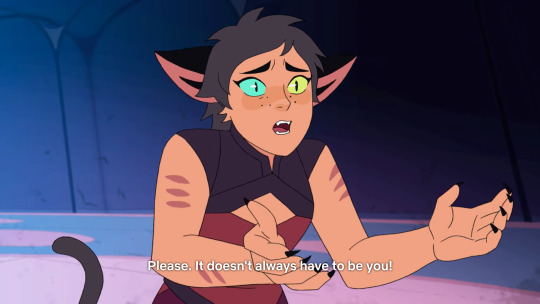
...
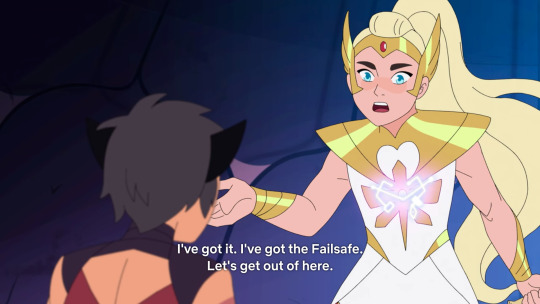
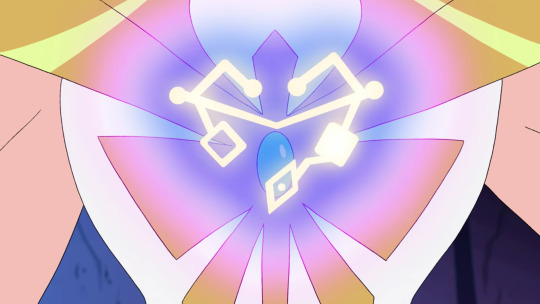
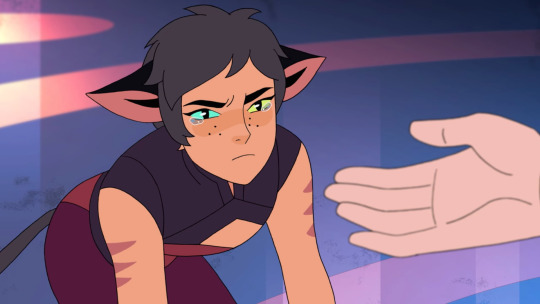
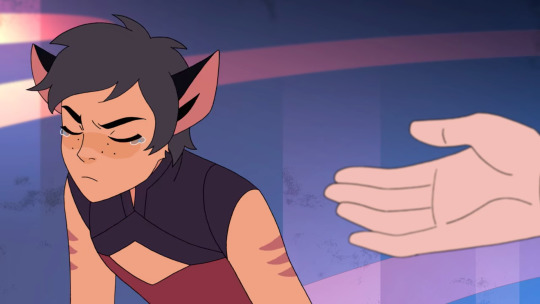

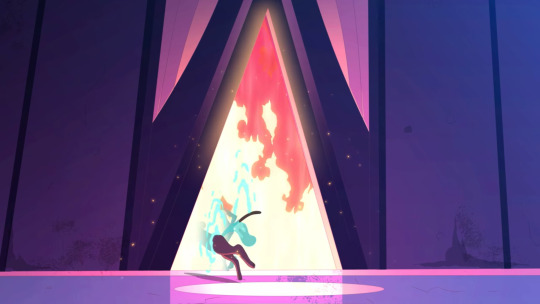
Secondly, it’s really funny that you brought up your frustration with the scene where Catra leaves Adora in “Failsafe” (S5E11) and the scene where Catra confesses her love for Adora in “Heart Part 1” (S5E12) because I have literally been thinking about these two scenes!
There’s a lot going on in these 2 scenes so I’ll do my best to break them down accordingly.
1) Scene 1
Starting with Part 1 of Scene 1:
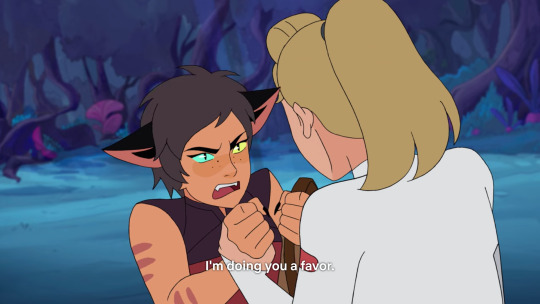


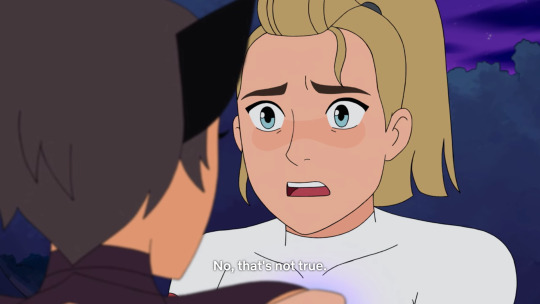
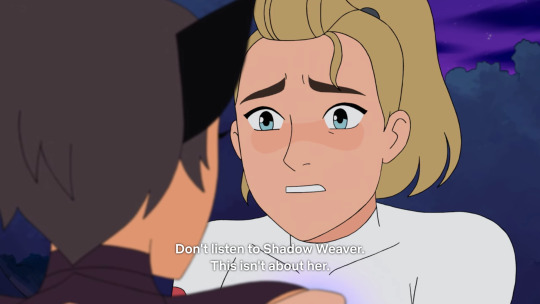

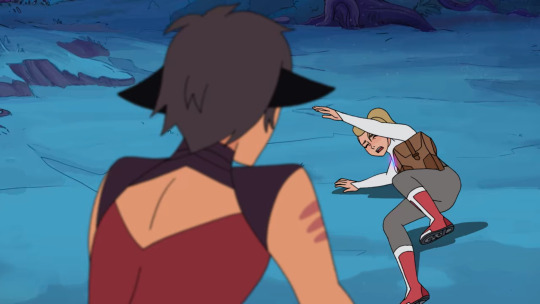
Part 1: Firstly, this part relates to a previous scene where Catra overhears Shadow Weaver comment on Catra being “a distraction”:
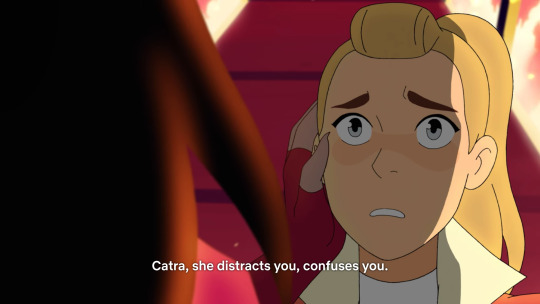
...
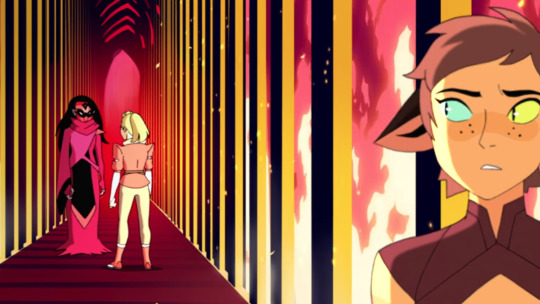
Part 1: So this part indicates that Shadow Weaver’s words affected Catra and influenced Catra’s decision to leave Adora.
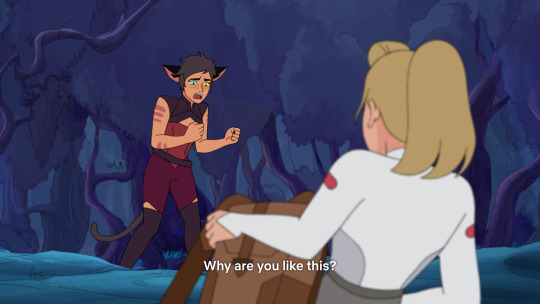

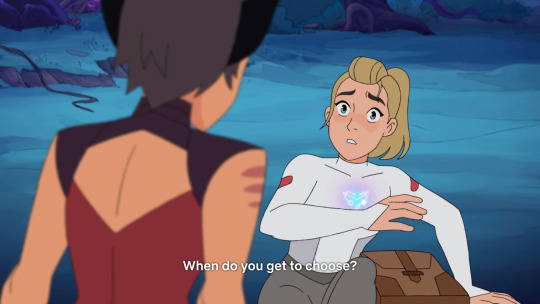


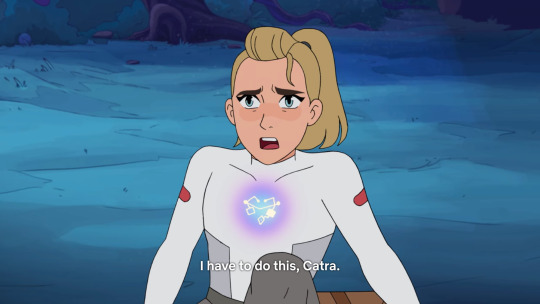
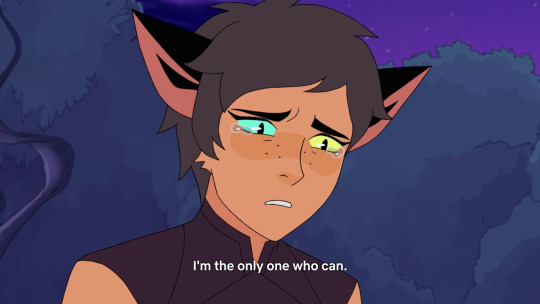
Part 2: This part demonstrates how Catra does want what’s best for Adora. Catra wants Adora to be happy and Catra wants Adora to put herself first.
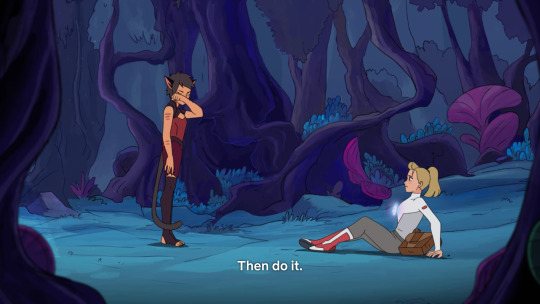


Part 3: However, this part demonstrates that Catra still doesn’t understand that Adora’s choice isn’t because Adora wants to sacrifice her life, rather, Adora is making a choice to save everyone. There is a lot of hypocrisy in this scene, since the very reason Catra is alive is due to the fact that Adora made a choice to risk her own life to save Catra even after Catra tried to murder Adora multiple times during the series.

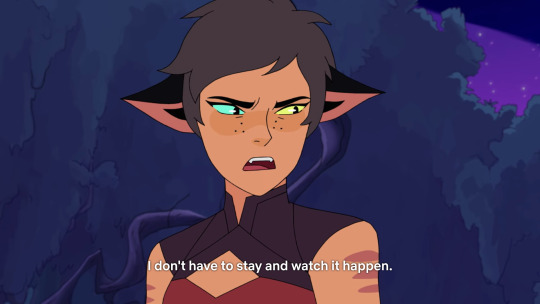
Part 4: Even though the statement “I don’t have to stay and watch it happen” has a meaning of “I don’t want to watch you die”, the words hold a harshness and the final facial expression is anger. Catra is angry with Adora because Adora is taking a risk that might kill her. But I feel like anger is not the right sentiment here. Adora is scared and making a hard decision to put her life on the line in order to save everyone. Adora needs support and Adora needs love.
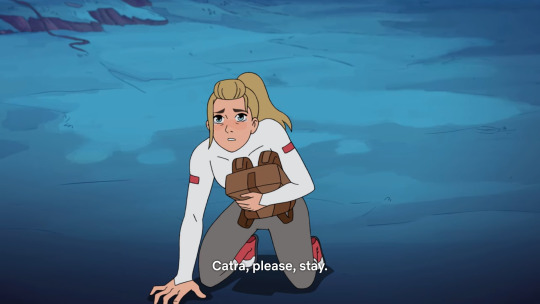


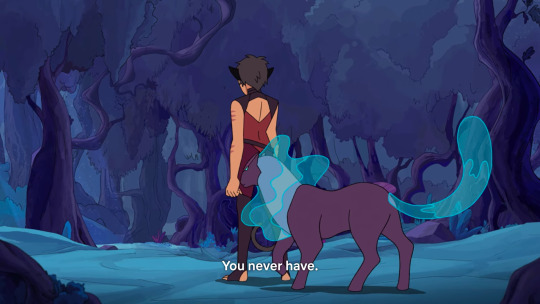
Part 5: I feel like this part highlights 3 key points:
- Catra was leaving more because of her own self-dislike and self-doubt rather than just leaving Adora purely out of spite. In this situation, I feel that Shadow Weaver’s words are still affecting Catra.
- Catra doesn’t listen to Adora or trust Adora. Adora is literally on her knees begging for Catra to stay and stating “I need you”. But Catra doesn’t believe what Adora is saying, even though Adora risked everything in order to rescue Catra from Horde Prime.
- Catra doesn’t stay to support Adora when Adora is scared. Even though, at the very beginning of season 5, Catra was scared and asked Adora to stay. And Adora listened to Catra, sympathized with her, and stayed to support Catra even though Catra tried to kill Adora multiple times throughout the show:

...
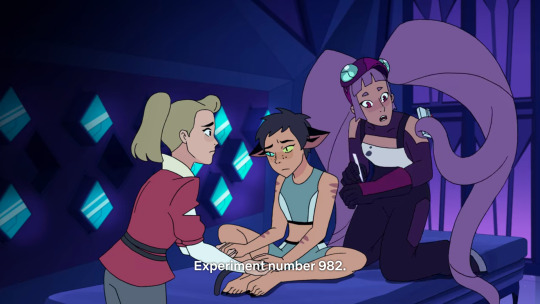
The main takeaway from this part is that Catra has not processed her trauma related to Shadow Weaver enough to the point where Catra can trust and listen to Adora. And I don’t expect Catra to have processed her trauma! Processing trauma is difficult and takes time. But I just want to present the fact that Catra still needs time to process her trauma because it’s clearly interfering with her relationship with Adora.
In addition, trust and communication are the most basic components of any friendship/relationship, so the fact that Catra’s and Adora’s relationship lacks these key components is very problematic.
2) Scene 2
Now, Scene 2 presents Catra at her most vulnerable, which is indicated by her confession of love for Adora. In addition, Catra’s reasoning for leaving Adora completely changes from Scene 1, which will be demonstrated in the next 3 parts:
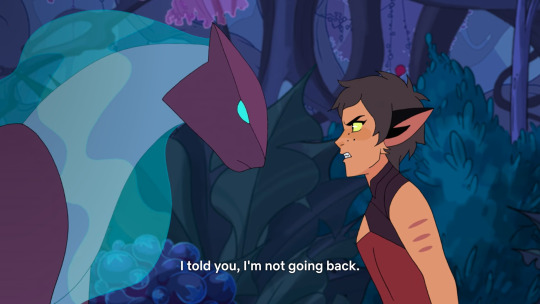
...
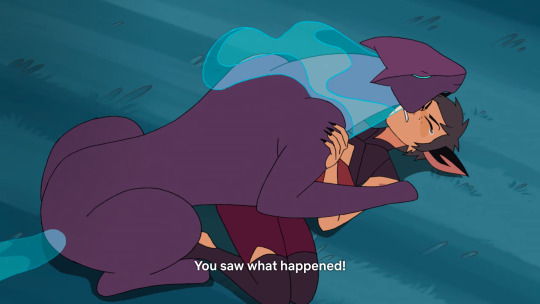
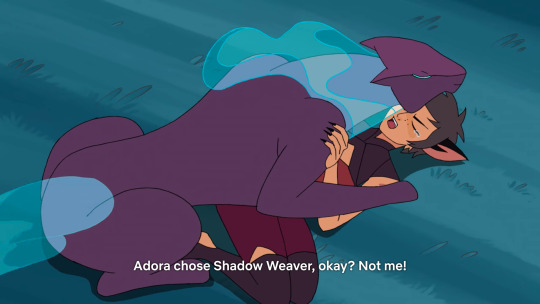
Part 1: This part shows that Catra still thinks that Adora is choosing Shadow Weaver over her. This is false. Adora’s choices are to help save everyone and Adora previously explained that to her:
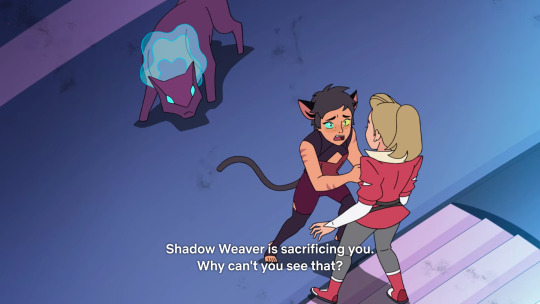
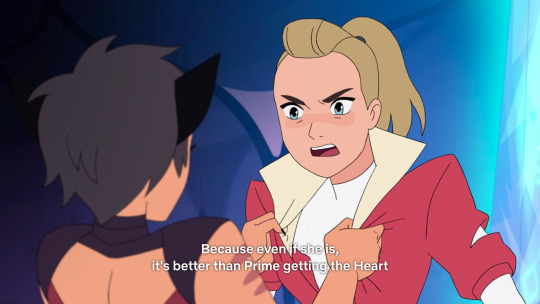
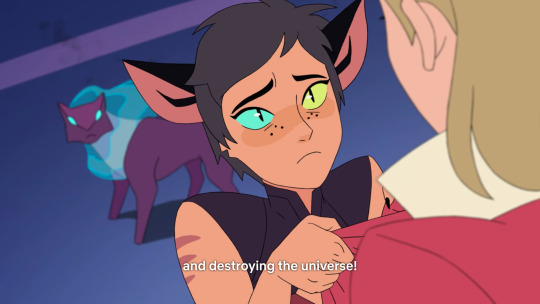

Next,

Part 2: This part demonstrates again that Catra doesn’t trust or listen to Adora. Adora literally said “Please stay” and “I need you” in the previous scene (Scene 1).

Part 3: This part further supports that Catra is focused on her wants and her needs. Adora is literally about to sacrifice her life to save everyone and Catra is concerned that Adora doesn’t reciprocate her feelings.
And so there is a stark disconnect between Scene 1 and Scene 2 about Catra’s reasoning for leaving Adora. In Scene 1, Catra leaves because she feels that she is not helpful to Adora ( Adora: “I need you.”, Catra: “No, you don’t. You never have.”) . However, in Scene 2, Catra justifies her choice for leaving Adora by blaming Adora for choosing Shadow Weaver ( Catra: “I told you, I’m not going back. You saw what happened. Adora chose Shadow Weaver, okay? Not me! ) .
So the fact that when Catra is alone and at her most vulnerable, Catra automatically shifts to blaming Adora is actually terrifying. In addition, Catra still does not understand that Adora’s choice to work with Shadow Weaver is a choice to save everyone. And this happened before when Catra was upset that “Adora left her”, but really Adora had left the Horde in order to protect innocent citizens from dying. Catra still doesn’t see the bigger picture of why Adora is making these choices that lead to the ultimate outcome of saving everyone.
Overall, the 2 scenes demonstrate that Catra doesn’t trust or listen to Adora. And Catra still doesn’t understand Adora’s choice to save everyone.
Thus, the 2 scenes are very indicative of the amount of growth and healing Catra still needs to experience before she can enter any romantic relationship.
Thank you again for sharing your frustrations with these scenes and I hope I explained the scenes well! ✨
#anti catradora#anti c//a#spop critical#spop salt#anti-catradora-receipts#i just wanted to say if you're processing trauma#or if you've ever processed trauma#i'm really proud of you#you're doing such a great job#keep going <3
131 notes
·
View notes
Photo

The Ultimate Playlist Of Noise (2021) - Review
CW: This movie discusses suicide and suicidal-ideation.
Marcus Lund (Keean Johnson) was known for making the ultimate playlist, for everything. Music and just sound in general was his thing, that was until one day at a concert he had a seizure and they found he had a tumor in his brain. Although benign, it still had to be operated on, which would cause him to lose his hearing and everything he thinks he’s ever known about the world. Upon hearing the diagnosis, Marcus decides to set off on a road trip to New York to listen to his brother one more time and to along the way, make “The Ultimate Playlist Of Noise.”
I finally had the energy to watch something new and since I’ve had this movie pinned in my Hulu library or whatever it’s called since it came out in January of last year I believe, I thought this might be a solid choice.
As a person who has a thing for making playlists and mixes, I knew from jump that this would kind of speak to me. The fact that it’s also in the “Coming-Of-Age-Teen Drama” category didn’t hurt either. It depends on how you want to take it, but I’m not so sure this one is a romance story, even though that’s what seems to be implied. The cover doesn’t have to have a kiss on it for that assumption to be made because most of these films have that as their baseline. To me this movie was really about finding yourself when you believe you’re losing it, there just happens to be a girl you’re attracted to in the passenger seat while you take that journey. It was also about family and friendship and so many other things, so if you’re looking for strictly a YA Romance, this might not be the one for you.
Again, it was a solid pick. It did activate the tear ducts at one point, so if that’s a sway-er than you should be sold. I enjoyed it and wouldn’t mind watching it again. There are some heavy moments in it for sure, however I don’t believe you’re going to feel weighed down by this one at the end of it, you actually might feel kinda light.
.
.
.
Side Conversation For Those Who Have Seen The Movie (Spoiler Free):
How old is Wendy? How old is Wendy’s abusive boyfriend? How old is Marcus? The boyfriend, from the minute and a half he was on screen, seemed like he was in his late 20′s at best, but more realistically in his 30′s. I just question because although Marcus is a high school senior, this feels like another story where ages are blurred to get people to not focus on them, but that can be a little difficult, especially when some characters look 10 years older. I’m not saying that Wendy is wildly older and that her and Marcus’s interactions were inappropriate, I just wonder who she is. It’s very common for Hollywood to make the girl/woman young, but also wild and running around on her own. I didn’t want to rush out and call her a Manic-Pixie-Dream-Girl, cause that feels reductive of who she is overall, I’d just like backstory, please and thank you. She’s obviously running away from something/to something, but even when you try to avoid the trope as best you can, you still often end up hitting the ice berg at some point. All that being said, Wendy is still trying to find herself as well and that shouldn’t be discredited.
Also I put this as a side conversation because it wasn’t something I hyper focused on or felt was a main takeaway, it was just something I saw/thought and wondered if anyone else, had similar thoughts as well.
PS: If this information is already out these and I happened to miss it, feel free to correct me.
#Movie Blurbs#Movie Reviews#The Ultimate Playlist Of Noise#Keean Johnson#Madeline Brewer#Ariela Barer#Emily Skeggs#Rya Kihlstedt#Ian Gomez#Oliver Cooper#Gordon Winarick#Hulu Originals#Hulu#Movies
4 notes
·
View notes
Text

Hello, everyone! Can you believe this is the third time I've started the recap for this chapter? Between a dying computer and a mass edit during my monthly state of, "Oh my god get rid of everything we can't let people know that we wRITE!" this project is cursed. This is the version though, I can feel it. Be positive!
Now, where were we? It's been some months (RIP) since I last posted, so I wouldn't be surprised if everyone's forgotten what's going on in this insane novel. A quick recap before the recap then: new teams have formed, no one is happy about it, Sun and Velvet went off to a shady club run by The Crown and — shock shock, surprise surprise — got themselves into a heap of trouble. That's the long and the short of it. We have to wait a while to find out what happens to them though because this chapter is focused on Coco.
We learn that Professor Rumpole has sent Coco and her new team — Team ROSC — out into the desert to take care of the grimm around the city's borders. To say that Coco is disappointed in this assignment is an understatement. We learn that they've been at this for a week straight and have gone without showering or a change of clothes that entire time (no one packed a bag?), so for a second I was hugely sympathetic. You know this vine?
youtube
I feel this vine in my soul. Give me hot water and hot coco or give me death. Besides, work is work and dangerous, physical work without a break or basic comforts is incredibly taxing. Toss in the extreme heat of a desert and I'd be pissed at everything too, no matter how important my work was. That's human.
Yet instead of humanizing Coco like this, it turns out she doesn't care at all about the hardship involved. It's fighting grimm that she's annoyed by. She thinks that "Searching for the person or persons kidnapping innocent people for some unknown but dark purpose was way more useful than fighting Grimm far from the city" and I'm just like, Coco, honey...
Do you know what your career path is?
IT'S TO KILL GRIMM.
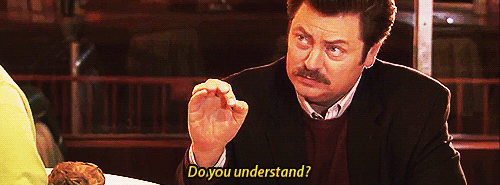
Okay, there's admittedly a justification here, but it's a stupid one. Coco goes on to say that "This area was called the Wastelands for a reason." She's snarky about it, saying that it wastes “her time, her talent, and her patience," but the real takeaway is that it's, you know, a wasteland. Deserted of grimm and of people. What's the point of defending an area that doesn't need defending? A huntress' job might normally be to fight grimm, but when those grimm aren't around and kidnappers are, that's a whole new set of priorities.
The problem with all this is that the Wastelands is definitely not deserted and it's definitely not as far from the city as Coco would like to imply. In just a few paragraphs an alarm is going to trip and Coco will find six grimm roaming in a pack. Then she finds a person. Then that person says she needs to get back to see someone in the city within half an hour. So there are grimm, there are people about, and this area is apparently close enough to the border that you can get back to the city proper, on foot, and then get wherever it is you’re going in a bustling metropolis... all within half an hour. By that logic these grimm aren't out in the boonies, they're right outside everyone's door.
Yet Coco isn't convinced, saying that "Post Beacon [killing grimm] had been for a noble cause, but this just felt like … busywork." I cannot possibly emphasize enough that this is the job she signed up for. Not to be a detective specializing in missing people, not a war hero always on the front lines of a battle, but one of many huntsmen who perform the daily, routine, very necessary task of protecting the people from grimm. With "protecting" covering both immediate threats and preparatory work that ensures more threats don't come about — like taking care of grimm outside before they become a larger threat. You know what would have happened if Beacon had a daily chore of students killing grimm within a few miles radius of the school? There would have been far less grimm charging a mass of unprotected students when negativity unexpectedly skyrocketed.
And, as always, I am aware that Rumpole is the likely villain here. From a writing perspective, this is very much presented as her getting Coco out of the way so that she can go about her nefarious deeds in peace... but that doesn't erase the fact that the task itself is a sound one. Rumpole's motivations don't matter here, only Coco's annoyance that she... has to do her job?

I mean yeah, everyone complains about their job to one extent or another, but can you imagine if you stumbled across a firefighter complaining about all the kitchen fires they've had to put out lately? "It's so boring! There are much better things I could be spending my time and talent on. I mean, that inferno that took out a city block last year? Putting that out was noble. But routine fires? House fires? Giving lectures on how to prevent fires in the future? Ugh, I can't believe the department expects me to do this grunt work." Meanwhile, you're sneaking off, hoping that this firefighter is never called to your house, nursing mild worries about how much they're romanticizing the recent tragedy that took so many lives...
Complaints about the job turn into complaints about the teams, which makes far more sense for Coco's character. Anyone's, really. Despite my insistence that it's a good thing they're learning to fight with people other than their three besties, that was absolutely a sudden and rather traumatizing change, just given how attached the teams already are. I'm not at all surprised that Coco is struggling to cope.
She says she misses her friends, obviously, but also "surprisingly, Coco missed being in charge."
...That's supposed to be surprising? Coco, you love being in charge! How is this in any way a revelation?
Apparently it is though, stemming from how bad Reese is as their leader. As with so many things in RWBY, I find myself disagreeing with a perspective that's presented as a fact: "She liked to lead by group vote, which wasn’t leading at all." Yes... it is? We could go down a rabbit hole of literal definitions — to lead is to direct, to direct is to regulate, to regulate is to direct again — but ultimately our understanding of a word does not adhere to the dictionary alone. It's a knowledge built on experience and I would hope that everyone's experience with the term "leader" includes that person considering multiple perspectives before making a decision. A leader doesn't impose their view on a group without due consideration of their preferences and needs — that's a dictator — a leader guides the group based on feedback and their personal knowledge. If that feedback and knowledge results in a standstill, or if their knowledge outweighs preferences, they are the deciding vote because the people have previously said, "We trust your decisions" through the act of making them leader in the first place.
Asking for a group vote isn't avoiding leadership, it's an act of leadership. Reese decided that these situations warranted a majority rule. She further decided that whatever they settled on was indeed an appropriate course of action. Leadership skills are required to assess a situation and determine whether it's appropriate to vote on in the first place. If I announce to a group that we're voting on whether we go to the movies or the museum, I've done the work to determine that both of these choices are of roughly equal value and roughly equal availability. I haven't hit on any snags like, "The only movies playing are mindless blockbusters and I want this to be an educational outing" or "The museum is too far away. We'll never make it to dinner on time." Figuring out that a group can vote is its own kind of work. This avenue is particularly useful when the group is of roughly equal standing. With a few exceptions (like Ruby and Jaune) huntsmen classmates are all the same age, underwent the same training, and have had the same combat experiences. This isn't a case of one elite huntsmen lending their knowledge to an otherwise green party, it's a school randomly pointing at a somewhat outgoing individual during orientation and saying, "You. You're leader material, I guess, even though you've done little differently than the person standing beside you." Someone has to lead and Vacuo's switcheroo proves that anyone can be the leader if they're just put in that position. Coco claims a group vote is just "passing the responsibility off to your team" and yes! You want to share the responsibility because you are a team. They are a group of four equals working together with one person to guide them, they are not a boss with three subordinates. Why wouldn't Reese utilize the skills and ideas of those teammates? When making a decision, why wouldn't she see if everyone believes it's a good idea to do Thing A as opposed to Thing B? Unless Reese is outright ignoring her own ideas, beliefs, or gut feelings to cater to the others — which there's no reference of — this is good leadership. She's assisting her team in making decisions as a whole, rather than arbitrarily imposing her view on three others of similar skill and experience.
Yet Coco acts like because Reese doesn't go, "We're doing Thing A! End of discussion!" it's not leadership. Which, frankly, says a lot about how the RWBY-verse sees leadership as a whole.

I realize I'm rambling a great deal, so let me quickly provide a different media example. I'm currently immersed in Star Trek: Voyager and in season two, episode 14 "Alliances," Captain Janeway is faced with a difficult choice: align herself with a violent and so far untrustworthy species, or risk traveling through this quadrant of space without any allies. At first she's entirely against the idea of an alliance, going so far as to say that this isn't a democracy. She's the captain, dammit, she makes the decisions! But her first officer begs her to reconsider. Then the crew express disappointment — even disgust — that she won't consider this alternative. Then her chief of security, being a Vulcan, provides a persuasively logical argument for why an alliance is worth the risk... Long story short, Janeway finds herself in the minority and changes her decision accordingly. She attempts to garner an alliance and the fact that she was right — the species wasn't trustworthy and the alliance fails — is entirely beside the point. She realized that the majority voice matters. As far as we know, Reese is already practicing what Janeway learned.

ANYWAY the point is none of it matters because these characterizations are a mess. Coco also throws out that Reese "dressed like she was a twelve-year-old hanging out at the mall" and supposedly acts like one too. We're not given any examples of what that behavior looks like and, sorry, but I'm not personally inclined to judge someone based on their fashion sense. It would be great if this story actually engaged with some of the flaws the characters demonstrated, rather than just throwing them out to exist in this unacknowledged void.
Not that Coco's fashion-focused personality is really that important. Truly, the best thing about all this is how contradictory Coco's own thoughts are. She also listens to her teammates... except when she doesn't. She know when to go with their ideas and when to dismiss them for her own... except when she gets it totally wrong. As with so much in RWBY, this doesn't feel like the author giving Coco deliberate flaws that the story will grapple with down the line, it just comes across as a nonsense philosophy about leadership we're not meant to examine too closely. Coco gets to make references to the fact that her own, supposedly superior leadership is filled with holes, but heaven forbid she engage with that.
She ends all this with the thought that no matter what she might decide, she trusted her team to "do what she demanded of them” and is now extending that courtesy to Reese. This I'm inclined to praise Coco for. No matter what she might be thinking, it doesn't appear as if she's tried to undermine Reese (well, not yet. More on that at the chapter’s end), and she doesn’t appear to be refusing to listen to that leadership, even if she doesn't like how it comes about. As we're about to see, Coco has her team's best interests at heart, no matter the challenges they're facing.
Her thoughts turn back to her old team and we get... this.
Velvet was with a team that didn’t recognize her awesome capabilities. Fox was withdrawing, having lost his family for the second time. Yatsuhashi was going mad with worry about Velvet and his teammates, knowing that he couldn’t be there to protect them, and worrying he would accidentally hurt someone on his new team.
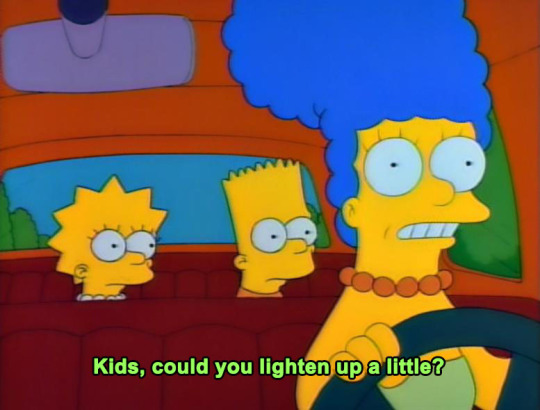
This is so unnecessarily dramatic. First, how does Coco even know any of this? Because it's been heavily implied that the old teams are barely in contact with one another. See: Velvet refusing to loop anyone in about the club and Coco stuck in the desert for a week. Second, why aren't they in contact, at least those who aren't on away missions? The entire group is acting as if changing teams means they're no longer allowed to be friends — family, as Coco puts it — when the relationship between Team RWBY and Team JNPR creates the opposite expectation right at the start of the series. Clearly, people from different teams can be close. Yatsu's worry that he might stumble using his semblance with new people is the only conflict that holds up here. Everything else has fairly straightforward solutions. Velvet needs to prove herself to new people. Yatsu needs to text Velvet if he's that worried about her. And Fox "having lost his family for a second time" is a pretty ridiculous exaggeration. You're attending the same school! Your family is still living down the hall if Vacuo has dorms like Beacon! In what world are these students unable to interact largely as they did before? They're acting as if the school has outright barred them from hanging out, rather than doing what will no doubt occur the moment they graduate: force them to work with different people. Just catch up with Fox over dinner!
Honestly, this chapter is pretty short, I'm just continually bewildered by this story.
To get back to the actual plot, something trips a sensor the group has set up and Coco responds to the situation in what I think is both a smart and empathetic manner. Previous experience has taught her that it's likely just a lizard, so she doesn't want to wake up her team for no reason. Disagreements aside, she cares enough to let them rest — "They’d probably appreciate the extra sleep." However, if it's a "rare case of something she couldn’t handle alone" she'd immediately call for help. Great plan! It's not often in this novel that I feel like I enjoy the characters, but this little moment actually had me liking Coco. Which, yes, I realize is a complicated claim. Characters should test the reader to a certain degree, mirroring all the personalities we see in real life, including biased, mean, or contradictory people. It's often a good thing to write a character that your reader is frustrated with. That can be the point! The problem with Myers' writing is that it isn't the point. Coco, as the former leader of our heroes in this tale, should be someone we enjoy spending time with and her flaws should be the basis for growth, or an acknowledgement that she is an imperfect, but well-rounded person. As it stands, flaws in this novel just sort of... exist? They bop around in the RWBY universe with almost no acknowledgement from the narrative or other characters, leaving the reader with little to nothing to take away from the text. Is Coco correct in her judgement? Is this a bias she needs to work on? Is she putting on a facade and her natural instinct to care for her team is the real Coco hidden underneath? Who knows! She’s just frustrating to read about most of the time and nothing comes of that.
Regardless, she heads out into the desert, using the night vision glasses Velvet made her.
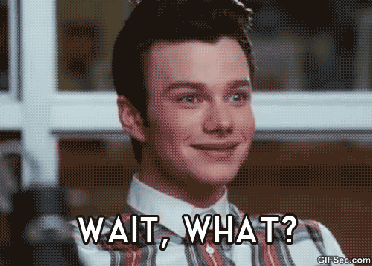
Now see, this would have been the perfect thing to introduce before Velvet was fixing relay towers after the expert was injured. Remember how I said the novel didn't do enough to establish Velvet's own expertise? Not that a pair of goggles is really comparable to fixing a communications issue, but it still would have gone some way towards convincing me that Velvet is this super impressive tech gal, capable of handling any and all situations that might come her way.
But no, we get this impressive display of skill after Velvet's knowledge was needed in a pinch.
The glasses help Coco navigate the terrain, allowing her to both see in the dark and zoom in on things in the distance. This allows her to spot the six jackalopes that tripped the sensor, as well as the woman currently fighting them: Carmine, a villain from After the Fall that I know nothing about. Ah well. Note though what I said at the start, that Coco's dismissal of this assignment is based entirely in its supposed uselessness. Yet now here we have a pack of dangerous grimm and an enemy to content with.
Also, this is where Coco moves from kindly teammate to overconfident fool. She said she'd call for backup if she needed it... and she clearly needs it! From what I can gather, all of Team CFVY lost to Carmine last time they met up. But now she wants to risk fighting Carmine alone? Go get the others!
She doesn't, of course. Carmine doesn't notice Coco at first. She's talking about how she has to get back into the city. "He’s going to kill me if I’m not back to the Mirage in thirty."
As said, this also implies that Coco isn't nearly as far out as she initially suggested. If Carmine can feasibly finish this fight, cross the desert, navigate who knows how much of the city, and meet up with the mysterious "he" all in under half an hour, then Coco is patrolling pretty much right at the walls. AKA, the area that absolutely needs to be grimm free.
Luckily for those of us who are reading the books out of order, Myers gives a quick recap of Carmine's significance. Last book she had kidnapped Gus and "held off the combined might of Team CFVY in the desert” (oh hey, I was right), presumably escaping afterwards. Now here she is again, likely up to some new, nefarious deed.
Our of curiosity, I googled to see what she looks like and...
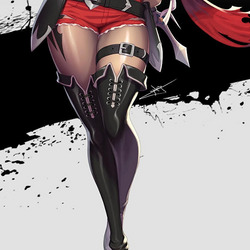
WHAT IS THAT OUTFIT?
Coco watches as she works to keep on top of the six grimm, debating whether she should help or walk away, but when Carmine is taken unawares, Coco acts without thinking, throwing herself into the fray.
Sometimes decisions were like that—your body already knew what to do while your brain was still processing the situation. Only in this case, Coco’s body wasn’t necessarily the clearest judge of character. Her brain would have said that Carmine didn’t deserve her help.
Now see, this is a scene I can get behind. The entire RWBY-verse is based around a type of superheroism: people with unnatural abilities, fantasy weapons, and extensive training devote themselves to protecting the people from various threats. Yet too often RWBY fails to convince me that these people are actually heroic, taking the standard flaws of a character and unknowingly exacerbating them to the point where I think, "Is this meant to be a commentary on the anti-hero? Or a critical look at these fantasy formulas? Because we've got the elements of that here, but no indication that the authors realize they're writing something other than that standard story." But this? This works for me. Coco, as a huntress, is so conditioned to help others that her body responds instinctively to someone being in danger, regardless of who that someone is. She outright admits that if she'd had the chance to think about it she would have decided against helping Carmine. The fact that she recognizes this and move anyway says a lot of good about her. Well done, Coco!

We see later that Carmine probably didn't need the help, but between the two of them the grimm really don't stand a chance. What's interesting though is how chummy the two are while defending themselves. Coco comments on Carmine's tendency to talk to grimm (like she does) and Carmine freely offers information about her movements, the fact that she lost her other sword, and that her partner, Bertilak, needs to "recharge a little" before getting back in the game. Carmine asks Coco if she'd like to team up with her instead (she does not) and the two have a number of flirty exchanges to top things off:
“I’ve been dreaming of a rematch with you,” Coco said.
“You’ve been dreaming about me? I’m flattered.” Carmine winked.
***
“Hot date with the Crown?” Coco asked.
“Don’t be jealous, darling.”
I bring all this up not as a criticism of the buddy-enemy dynamic (it's a favorite of mine), but simply because of something that happens next. Before we get to that though, I admit that I am on the fence about the flirting. Given that I haven't read After the Fall (assuming this characterization exists there), I know that Coco is a lesbian mostly via RWBY cultural osmosis, rather than through the text. This is one of the few (the only?) times that I've gotten a hint at her sexuality, yet it's associated with predatory behavior. Carmine, her enemy, is the one who turns an angry dream into a flattering one, the hot date with the bad guy into something to be jealous of. I'm honestly struggling to remember what, if anything, Coco has had to say about women in this book — this is what comes of such slow recapping and I acknowledge that this is entirely my fault — but I'm nevertheless discomforted by knowing Coco's canonical status, knowing RWBY's struggles with queer rep, and then reading a scene where the most overt representation thus far is the bad guy twisting Coco's words into something sexual.
I'm no purist. Give me a good enemies-to-lovers fic any day of the week, but that doesn't mean that kind of dynamic is the best to pull from in a franchise already facing heavy criticism for its queer rep.
Especially since the moment the grimm are gone Carmine turns her sai on Coco.
This is the "something that happens next" that I referenced above. It's weird to have them attacking one another after a whole scene of pretty genuine companionship. Coco doesn't help Carmine as a consequence of defending herself, she willingly gets involved. They tease one another. Carmine appears to answer her questions honestly. There's both implied and overt references to how well they work as a team. Then, suddenly, Carmine is outright trying to kill Coco, not just with her sai but by burying her alive. It's not the sort of banter that Ruby and Roman used to engage in, trading fake compliments and, in Roman's case before his death, legitimate feelings while attacking one another. Nor is Coco prepared for an attack the moment the grimm are gone, and she's not surprised by it. It’s just this sudden change that feels rather jarring.
Though it's far from the first time BTD has failed to convey the emotion of a scene. Here's another example rnow. As said, Carmine is attempting to bury Coco alive by moving the sand with her semblance. That's horrifying enough on its own, but remember that Coco is claustrophobic. Yet none of that panic shines through here. She comes across as indifferent throughout the attack, thinking back to summers when her brother tried to bury her while she sunbathed, amazed that she could ever consider this fun. You know who Coco sounds like in this scene?

At no point during this attack did I get the sense that Coco believes she’s in serious danger, let alone that she's struggling against a long-term phobia. The only time I even remembered that claustrophobia is meant to be a challenge for her is when she throws out the oh-so casual line, "One of her worst nightmares was being buried alive." Oh really? Because it doesn't seem like it! Coco is calm enough to remember that she used to be able to hold her breath for exactly three minutes and forty-two seconds. That doesn't feel like a character fighting against her worst nightmare.
So this scene isn't exactly compelling. Which is too bad because, as said, Coco as some other nice moments in this chapter.
However, during all this we do learn a little more about Carmine. Prior to getting trapped in the sand, Coco comments on how shockingly strong she is. "Carmine should have been at least a little bit worn down from fighting Grimm," but she's not, "She seemed nearly unstoppable now." Coco hits her full in the face, but she doesn't seem fazed. Earlier in the chapter there was that comment about how she previously took on Team CFVY alone and at the end of the battle Coco observes that Carmine "still seemed as fresh as she had at the beginning of the fight. How was she even doing that?" My basic reading comprehension skills tell me that this is setup for something, likely some change enacted by the Crown. Surely the text wouldn't put so much emphasis on Carmine's strength — have Coco questioning it to this extent, framing it as unnatural — unless we were going to get an answer, right?
But this is RWBY, so I'm not inclined to count my chickens before they hatch.
The rest of Coco's team arrives and it's then that she decides to pull the super dangerous stunt to free herself. Yeah, yeah, I get that she's suffocating and needs to do something now, can't wait to be dug out I suppose, but the timing is pretty ridiculous. The cavalry has arrived, yay! Time to blow myself up.

Seriously. She blows herself up. Using her own semblance, Coco focuses on one of her gravity dust bullets and detonates it, causing all the others in her arsenal to detonate too. It gets her out of the hole and "knocked her Aura down to a dangerously low level."
So... let’s see. Coco can literally detonate a bunch of explosives on her person, after suffocating under stand, after fighting Carmine, after fighting grimm, after a week long mission, and her aura doesn't break... but Yang's does from a single Neo slash?
Okay, RWBY.
Reese and Olive try to attack Carmine together, but end up eliminating one another's attacks. I like that a team actually has some realistic difficulties for once. Coco, however, is internally an asshole, calling them "idiots" and saying that they need to learn to coordinate their attacks. Thing is, she apparently hasn't done anything over the last week to help with that. She's been too busy complaining about Reese's clothes.
Carmine runs off as more grimm show up, drawn by Coco's non-existent panic. To her credit she does thank the others for saving her... but then immediately tries to downplay that. “It wasn’t a fair fight,” Coco spat when Reese (correctly) points out that she's the one who was ambushed. She also starts giving orders and when Reese (again, correctly!) goes to point out that she's the leader, Coco talks over her, saying they can't waste any more time out here because she has reason to believe that Shade has been compromised. She needs them only because she's out of bullets and low on aura, but they definitely need her because "let’s face it, I’m the best strategist around for miles."
Coco's a strategist?
And why does she sound like a villain trying to convince the heroes to work with her? She’s already part of the team!
Putting all that aside for the moment, we're back to this prideful characterization. I liked the well-rounded Coco from a few pages ago who balanced caring for her team with the likelihood of needing backup. Now she's flinching from the idea that she'd ever need help (hello, Sun characterization too) and snatching Reese's role the moment she's given the chance. So much for respecting her position. If the book wants me to believe that Reese is unfit to be leader and this is a golden opportunity for Coco to right a wrong... how about we actually show Reese being a bad leader?
Regardless, yay working together? The chapter ends with them presumably taking out the grimm before heading back to Shade, along with an important revelation. Prior to leaving, Carmine asked Coco why Yatsuhashi and Fox weren't rushing to her aid. It's only now that Coco realizes she didn't mention Velvet. Why? Perhaps because Carmine already knows where Velvet is, which obviously doesn't imply anything good.
And that's the end of Chapter Ten! Can you tell I never know how to finish these recaps? Describing cliffhangers doesn't have quite the same punch as, you know, actual cliffhangers. You all just have to suffer through my mediocre endings with me.
But would you look at that! Turns out the third attempt at writing this was the charm! :D
See you for Chapter Eleven! 💜
30 notes
·
View notes
Text
Problem One: The Screen(s) and Digital Workspace
Part one of my multi-part doc about what I learned from doing online college at a non-online institution. This chapter: my Desktop as a Desk
Highlighted points: learning styles, work type/function in relation to the computer
My biggest problem with being pushed online after being at an in-person institution was, and still is, my forced reliance on the computer. I have to sit in front of it for hours: attending classes on Zoom; checking email every three hours; accessing Moodle pages for class and out-of-class work (Moodle is what my institution uses, other web management/e-learning software platforms include PowerLearning, Blackboard, and OU Campus, among others). And the work itself can be watching documentaries, watching seminars, accessing ebook/PDF documents, annotating documents in online portals… it's a lot. People have talked at length about "zoom fatigue," as well as the eyestrain headaches that can come with staring at said screens for hours at a time. I'll talk about my own lessons learned about that later.
The assumption among the administrators and (some) people of older generations than those currently in school seems to be that working online with computers and smartphones is more efficient. That isn't necessarily true; it all depends on the type of task and the person being expected to complete it. In my case, I cannot, for the life of me, focus on dense sections of text presented on a backlit screen. Thus, reading and answering emails is okay, but downloading scanned textbook pages to be read on a laptop screen (along with trying to highlight and annotate them) is hell on earth.
Why is this? Different reasons for different people, but in my case it's because reading/"writing" on a screen interferes with my learning style(s), which are visual/spatial, audio, and kinetic. Audio doesn't come into play for reading on a screen, but seeing words physically in a certain location relative to other words on a page is very important to my memory of the material. Computer screens can display pretty much anything at any given time; book pages can only display whatever was permanently printed onto them. That is, the content of a book page in physical space will always be the same unless you, the reader, manipulate it; a computer screen can have any type of content displayed as long as its pixels can light up and process the information. And for me, that's a problem because I don't have any physical space to relate the information to, plus I don't get a sense of how long the document is. Recalling a passage in a printout, for me, goes like this: "I remember it was on the top-left of a page towards the beginning, the shape of the paragraph was funny too… ah, there it is." Recalling a passage on a digital scan of the same document is much harder for me by contrast: literally any of the paragraphs could have made its way to the top-left of my computer screen, if I moved the window around or zoomed in to better read the text; documents are an endless scroll upward or downwards, with (maybe) a sidebar to tell me what page I've landed on. All of my "landmarks" are functions of the program I am using to access the document. They're static and contained to a window... that can show up anywhere on my computer screen. Not conducive to the way I learn at all.
My kinetic learning style comes into play with the computer, too. Annotating a document? In the physical world, a pen on the document itself does the trick; going through the physical movement of circling a word or making a note are things that solidify the information in my mind. Annotating a PDF document? First of all, it's difficult to do with a mouse (and God help you if you have a trackpad), and it's highly dependent on the program that the user selects to open the PDF. I could connect a drawing tablet, if I have one, but they're very expensive and their use is, again, dependent on the compatibility with whatever reader program the user selects. All this to say: annotating on the computer doesn't work for me, either. My kinetic and visual learning styles come together with note-taking. My memory is highly dependent on seeing words as they are formed by my own hand, processing them, and connecting meaning to them as they sit in a specific place on the page (am I over-explaining this? Basically, writing notes by hand and seeing where those notes are on a piece of paper help me remember them). Typing notes isn't a replacement for hand-writing notes for me; while I'm busy fixing my typos (on words I would never misspell on paper, usually, since my fingers are just moving weirdly over the keys), the professor moves on, and I'm not listening well enough to catch the fact that I've missed new information.
The takeaway here is figure out your individual types of work relate to being on the computer. As I said, the computer hinders many aspects of my learning when it comes to memory and efficiency. As a creative tool, however, it has almost the opposite effect; writing assignments for fiction, poetry, and screenwriting classes are much more efficient on the computer. From creative thought to keystroke, I have less time to second-guess or forget my ideas, and both the immediacy and changeability of word processing programs actually works in my favor for those sorts of things.
What I did differently from first online semester to second:
1) I figured out which materials helped me remember my notes the best. Honestly, I wasn't even doing this when I was at in-person college, and to my detriment, but I couldn't get away with it at all once I went fully remote. Think back to when you were in lower levels of school: were there certain types of materials you gravitated towards in the classroom? Did you like basic composition notebooks with faint blue lines? Wide-ruled or college-ruled paper? Did you discover that graph paper just worked really nicely with all notes besides math, or that blank pages were less busy for your eyes? When you used pens, did you prefer blue or black ink, or did colored ink help certain things stick? If you can control what materials you use to take notes with, consider using ones akin to those from a class you either a) remembered the most fondly or b) remembered the most information from. Scour your memories of class experiences for anything, no matter how small, that may have made your life easier. Equally, take note of what tasks actually worked well digitally. Adjust accordingly.
(Personally, I found my magic formula was a 1-subject memorandum notebook — marginless, with very narrow line rulings; while I hesitate to direct you to Amazon, they are hard to find at a decent price otherwise, and you can get a 12 pack for just over $40 from them — with black ink from a 0.38-size gel pen (I used a basic Pilot G2 pen until it ran out, then bought ink refills in the smaller size). To "highlight" my notes, I circled or underlined information with a blue gel pen of the same variety. Keep in mind again that I'm learning to be a translator; this is just what works for me.)
2) If I needed to print something out, I printed it out. Environmental guilt is something I struggled with a lot, and there was always something about staying on the computer that convinced me I was being "less wasteful" by staying digital. But with how much time and energy I ultimately saved reading a printed document that can be recycled vs the electricity I ate up spinning my wheels in front of the ebook… to me, it was worth it. If you find that helps you, too, don't be ashamed to print certain things out.
(If conserving ink and paper is a concern to you, it is possible in some viewing/editing apps to remove or cover images, either with white squares or by taking the images out completely. I have an old MacBook Pro and on current versions of Preview, one can draw shapes and fill them in white to cover parts of the scan that would eat up ink, such as blurred black borders and scanned images. For documents in a word processing program like Microsoft Word or Pages, it may also be possible to print the documents out at a smaller size, allowing more text or even multiple pages to show up on a single sheet of paper.)
| In the coming days/weeks I hope to be posting more content about how I tried to adapt to fully remote learning and the things I’ve learned along the way! Follow for updates ♥︎ |
#college#university#online#online learning#school#online school#online university#online college#covid#covid 19#studyblr#student#students#blog#writing#my writing#narrative nonfiction#nonfiction#narrative#advice#language#language major#liberal arts#liberal arts college#creative writing#computer#computers#screen#screens#screentime
58 notes
·
View notes
Text
Runeterra Retcons 9: Shaco
The time has come to discuss League’s resident killer clown… Or killer jester, I suppose. There is a difference, not that it really matters because even the lore doesn’t ACTUALLY know what Shaco is. To be frank, Shaco is a weird character because he’s NEVER had a proper place in the story, even from his conception.
Shaco’s original lore paints him as a complete and utter mystery. Nobody knows who or what he is, where he came from, or what he really wants. All anyone has ever known is that Shaco loves killing people because he thinks it’s funny. He could be a demon, a rogue weapon, or just a homicidal madman who’s really good at what he loves. That’s where his character begins and ends, so there’s really not much to actually analyze here. Shaco’s second lore attempts to give us a little more detail but all it really does is say the exact same thing with more words added in.
Of course, Shaco’s first two lores were written at a time with the Institute of War and Summoners were still canon, so after the retcon back in 2015 Riot opted to give him a new backstory to make him fit in with the new world of Runeterra. That backstory, as we can see, is ultimately little more than a placeholder. I mean, his extended bio doesn’t even match the blurb on his Champion page!
In summation: Shaco is a haunted doll who belonged to an unknown prince of an unknown kingdom and was transformed by unknown magics for unknown reasons. This backstory now feels especially redundant with the introduction of Gwen into the game, a living doll with a similar backstory albeit far less evil. To be frank: there’d be room to have some interest thematic parallels between Gwen and Shaco if Riot had written these two in such a way that they were creations of the same person or belonged to the same kid but wound up becoming wholly opposite of one-another.
For example: perhaps in an alternate version of the lore, Gwen comes to embody the childlike innocence and hope of her maker/owner and seeks to spread joy and cheer while Shaco is a corrupt and perverted manifestation of those desires who seeks only to amuse himself in the suffering of others. This, I think, would have been a fantastic way to go about it, but given that Gwen is already so heavily tied to the Shadow Isles plotline and Viego is set up to be her primary enemy, I feel like it would be kind of difficult to work Shaco into that dynamic at this point.
Besides, it’s clear that Riot DOES have plans for Shaco: namely, that they aim to retcon him into being a demon. This is somewhat evident by his champion title, the Demon Jester, as well as his relationships are listed as being Nocturne and Fiddlesticks, the demons of nightmares and fear, respectively. There’s also that branch on the demon family tree labeled “Delirium” which would fit a murderous jokester pretty well.
To be honest, I was initially hesitant to even bother doing an episode for Shaco given that Riot clearly has at least some vague idea of what to do with him, but since reworks are coming out a lot slower now and Shaco’s not even on Riot’s priority list as far as we’re aware, it’ll probably be a WHILE before we actually see them do anything with this particular concept.
So, given what we know about Riot’s current plans, the general direction of this rewrite is simple: make Shaco a demon. Admittedly, though, that’s a little easier said than done. Demons in League are creatures who feed on mortal pain and suffering, but each of them has a different way of going about it. Fiddlesticks mainly uses paranoia and trauma to drive his victims mad while Nocturne takes a more Freddy Krueger approach of just invading dreams and turning them into nightmares. Tahm Kench likes to make Faustian Bargains by giving you everything you want and then tearing it all away from you, while Evelynn lures you in with seduction and then proceeds to tear you apart piece by piece.
Every demon takes a different form and has different ways of going about things, but all of them share a core concept: they feed on suffering and misery, be it physical or emotional. That said, there’s a bit more to demons in Runeterra than just that. See, back when Fiddlesticks was released, Riot went and released what the community has dubbed the “Demon Family Tree,” which appears to be a chart displaying the hierarchy of demons and different emotions that different kinds of demons can prey on.
Now, admittedly, there’s a LOT about this chart that we don’t currently understand, and frankly I wouldn’t be surprised if Riot doesn’t either. There’s a key that resembles the one around Zoe’s neck in the top-left, a bunch of circles in the top right we don’t know the meaning of, and a whole bunch of text written in what I think is supposed to be Old Noxian that we can’t currently decipher. There have been theories and discussions about this already, so I’m not going to get too deep into it, but the main takeaway, I think, would be the words on the chart that we CAN read: Fear, Delirium, Nightmares, Secrets, Bliss, Frenzy, and Obsession. There’s also the term “Azakana” at the bottom, though we know thanks to Yone that this basically just refers to a demon that hasn’t fully matured yet.
Tying the chart back to the demonic Champions in the game, it’s easy to piece together the connections that they each have: Fiddlesticks is fear, Nocturne is Nightmares, Raum (the demon bound to Swain) is Secrets, Evelynn is commonly believed to be Bliss, and Tahm Kench is most likely Obsession. That leaves Delirium and Frenzy untouched, which leaves us with two spots to fit Shaco into.
Now comes the hard part: the decision. Delirium refers to a state of mind in which one’s awareness of their actions or environment is significantly reduced, whereas frenzy is a sudden burst of frantic, uncontrolled emotion, typically rage or aggression. Either one of these could work well for a killer jester, but I personally think that delirium would suit Shaco better in terms of how his personality is portrayed in game. So, with that said, let’s dive deep into the realm of demonic and see what can be done to turn this cursed puppet into a proper Demon of Delirium.
It is often said that misery and comedy are but two sides of the same coin. Laughter often comes at the expense of others, and one person’s despair may be another’s delight. Most entertainers would tell you that walking the line between humor and malice is key, but to Shaco, such distinctions are a joke for which he himself is the final punchline.
The demon known as Shaco has stalked Runeterra for ages, spreading his twisted influence far and wide. There’s nothing Shaco loves more than to bring joy to those who need it most, often appearing to mortals who have experienced great loss or tragedy. Those coping with grief or misfortune may find themselves unexpectedly visited by a grinning jester, who assures that his only desire is to take away their pain with the power of laughter.
At first, Shaco’s antics are innocent enough. Some cheesy jokes to lighten the mood, some harmless pranks to lift the spirits of the downtrodden, all with an unyielding smile that one cannot help but start to imitate. Soon, those enthralled with Shaco’s antics are invited to play games with the jester to help distract from their worldly worries. Those who accept are whisked away to partake in a day of fun and merriment, playing all manner of pranks on friends, family, and even innocent bystanders.
When the games end, Shaco leaves his playmates cackling insanely in the aftermath, often surrounded by bodies and covered in blood. None laugh louder than Shaco, however, who delights in watching his playmates slowly regain their sanity and come to realize all the atrocities committed at his side. Some cry out in despair, while others break down laughing or crying harder than before. Some go mad, others are executed for their crimes, and some even opt to take their own lives. All outcomes are equally hilarious to Shaco, who soon sets out in pursuit of his next playmate.
Stories of the Mad Trickster exist all across Runeterra, often told as children’s tales to teach valuable lessons: don’t trust strangers, never give in to sadness or despair, and always be mindful to never take a joke too far. Few truly believe in Shaco’s existence, but those who fail to heed such warnings may find themselves to be his next playmate, as well as the butt of his joke…
So, this one was a bit shorter than normal, but I think it serves to get the point across. As the embodiment of delirium, I wanted to give Shaco a set-up sort of similar to Tahm Kench: he appears to offer help to those in need, only to end up ruining their lives in the long run. The difference, of course, is that Shaco lures people in to help them forget their troubles with fun and games, only to escalate to full-blown murder and mayhem.
In essence, Shaco drives others to delirium, making them believe the carnage is all just fun and games until his spell is broken and reality sets in. I’d like to think he particularly likes preying on the downtrodden because those who are suffering mental anguish already are easier for him to cast his spell on.
This is just my take on Shaco, though. Who can really say what Riot will do with him in the future? Who knows, his rework might end up even better than what I have here, but of course, anything is bound to be better than his current, non-existent lore.
18 notes
·
View notes
Text
What to do when your characters stop acting how they should
We’ve all been there. You’re breezing through a draft and all of a sudden a character does something or says something that they really shouldn’t, or maybe they’ve taken on an entirely new personality from when you were writing them yesterday.
Whatever the case, it’s frustrating as hell. So, how are we, the writers, supposed to handle this?
The first thing you need to do is stop writing and take a hard look at what happened. I know that this is often difficult for us to hear and come to terms with, but our characters really don’t just do whatever they feel like - we’ve crafted them and built a story around them (or built them for a story), which means that we are 100% fully in control of them. When your character does something unexpected that’s still in character, then that means that you’ve built them up to a place where writing them is subconscious (yay!). However, when your character does something unexpected that’s entirely ooc, that means that you took a misstep somewhere. But that’s okay! These things are perfectly fixable.
Scenario 1: A side character has a sudden and complete personality switch in a scene (ex. your MC’s love interest suddenly went from being indifferent and full of snark to being incredibly tender and sympathetic to your weeping MC).
What happened: Probably one of two things (though maybe both). You either gave the scene to the wrong character, or you haven’t built up the Love Interest enough to allow for this sudden soft side.
How to fix it, part 1: Rewrite - just a little. If you gave the scene to the wrong character, it’s easy to switch out. Maybe that fits in the same spot, or maybe it doesn’t. If MC is alone with character A when they start crying, but they really need to be alone with character B (who will comfort them and still be in character), then the crying scene should move places in the draft and be replaced with some different form of dialogue between MC and character A. Or, maybe (no one wants to hear this, sorry), you need to cut the scene entirely. MC is allowed to cry by themself, or maybe MC doesn’t need to cry on-page at all. Cutting the scene is always an option, though no one likes to kill their darlings.
How to fix it, part 2: Rewrite - a bit more. If this is going to be a groundbreaking moment™ between MC and Love Interest, but Love Interest showing this kind of softness seems uncharacteristic and out of place, then you’ve missed some character building within the draft itself. Maybe this scene makes sense in your head - you know that Love Interest has a soft side, but clearly the draft is looking at you like “no???? Love Interest is rude™” or you wouldn’t be having an issue. So to solve this problem, you’re going to have to add in instances of foreshadowing prior to the scene. Maybe Love Interest has a younger sibling and MC sees them being nice to them. Whatever you decide on, just make it so that an average reader will be able to see this coming (also imo for this exact situation, don’t let Love Interest immediately be tender to MC. it’ll feel more natural to the reader if Love Interest doesn’t want to be vulnerable right away but slowly softens as MC keeps crying).
Scenario 2: You change an aspect of the plot (at any point in the drafting process) and your character (or multiple characters) change dramatically (ex. you decide that instead of MC meeting character A at the beginning of act 1, MC should meet character A at the end of act 1 and now MC’s personality has taken a downswing).
What happened: You were relying too much on character A to guide your MC’s personality (a.k.a. MC isn’t developed enough to stand alone).
How to fix it: Back to the drawing board (sort of). If your MC’s personality changes dramatically every time you move something around in the plot or their backstory, then you need to stop writing and aim your diligence at your MC. Basically, they just need to be fleshed out more. No more “their favorite color is green and they like rock music and they had their first kiss when they were 16.” That’s too surface, especially for an MC. If their personality isn’t pinned down for you yet, it’s time to start thinking about their backstory - and I mean all of it. When they were 4 and fell off their bike and scraped their knee, did they get back up or did they get scared and refuse to try again? Go through their life, bit by bit, thinking of anything that could shape their personality. If it helps to create a timeline, do so. If it helps to write it all out, do so. Anything to get you more centered on them. Once you have a good grasp of their backstory, their personality should be evident through how they responded to circumstances throughout their life. The takeaway here is: if moving things in your story affect your characters more than your plot, you have a character problem, not a plot problem.
Scenario 3: You’ve finished a couple drafts and you’re ready to go for a full rewrite, but your characters (who have spent an entire novel developing and persevering through the trials you’ve thrown at them), now want to start the book as developed as they ended (ex. MC who learned how to perfectly control their magic by the end of the book can’t seem to come to terms with the fact that they can’t use their magic very well at the beginning).
What happened: You didn’t wait long enough before you started the rewrite.
How to fix it: Stop writing! Go read a book, or a whole series. Start writing a different wip. Take up a different hobby to fill the space this wip has created. Just don’t write!!! At this point, you should not be going back through for a rewrite until you’ve pretty much forgotten about your wip. Wait until the characters are a little further back in your mind - until you don’t remember every twist and turn you put in your story. Just don’t start your rewrite until you’ve forgotten how your characters behaved when it ended.
What does this boil down to, then? Ultimately, you are in charge of your characters. You need to have a grasp on their personality and progression to be able to mitigate any changes you need to make to your wip. Your characters really, honestly don’t have a mind of their own, so when they start acting up, it’s time for you to put down the pen (metaphorically or not) and start problem solving. It’s always fixable.
#writeblr#writeblr advice#character development#writing help#character help#characters#long post#(most writeblr posts are long but the warning stays)
3K notes
·
View notes
Text
PERSONAL BLOG :-)
Asheel Nair (Me18b101)
Course - MS4100 ( Soft skills)
First of all thanks Viji Ma'am to teach this wonderful course and making me understand and help me to grow and realize my skills that will help me personally as well as in professional growth.
1) Meaning and Purpose
It was a very great session to attend as it gave a lot of insights about life and insisted us to find our true worth and value of life in this world.
There is a statement which touched me very much- “Ultimately, man should not ask what the meaning of his life is, but rather must recognize that it is he who is asked. In a word, each man is questioned by life; and he can only answer to life by answering for his own life; to life he can only respond by being responsible.”
We are all hungry for meaning, for purpose, for the feeling that our life is worth more than the sum of its parts. We can find meaning in the sublime, in the absurd, in the dull and dreary, and in the perfectly wretched in life. That's when Viji came up with the word 'ikigai'- Combining the Japanese words iki, meaning life and gai, meaning value or worth, ikigai is essentially about finding your purpose in life. for exampe- Ikigai means “the reason you wake up for in the morning”
Then Viji told us to write our purpose of life in our book :-
What i love most- Video Games, family, friends, dogs
What i am good at - Maintaining relations, consulting
What can i get paid for - Consulting job or maybe some unexplored fields(who knows xD)
what the world needs- world is selfish and everyone wants profit in each and everything they do, the current world needs humanity and needs to develop a sense of empathy and helping nature.
Always know your true worth and realize it because it is only you know your true worth and value and always be grateful for who you are.
2) The '5S' principle
:- It was the first time i came across this principle and trust me it was worth it :)
What are the 5 principles of 5S?
5S stands for the 5 steps of this methodology: Sort, Set in Order, Shine, Standardize, Sustain.
5S is designed to decrease waste while optimizing productivity through maintaining an orderly workplace which will help you bring positive thinking and productive solution.
Application - I applied this principle in my room which was dirty and messes up. I cleaned everything and kept everything in a proper way. After implying this principle it felt very comforting and nice.
3) Time-Management
It is one of the crucial factors to live a peaceful life without any tension and stress. The person who has time management skills are very calm and comforting and always live a peaceful life. Everyone has the same 24 hours, however, some make better use of their time than others. This is one of the reasons why we have people who excel at the things they do. In other words, people may become busy; but that necessarily does not mean they are effective at their task. Hence, time management plays a crucial role in personal and professional life.
Time management may be a conscious effort to spend a selected amount of your time to perform a task efficiently . Furthermore, productivity is the key focus here. The more productive the work, the higher are the results. Moreover, time management requires a careful balancing between business life , social life, the other hobbies or activities. From an academic perspective, time management is a necessity. Students have many subjects to hide , therefore, efficiently managing time is a crucial skill.
The main problem we all face is the lack of time. Having so many things to do and yet not enough time to do them all. Through my conversations with many, I realized that I was not the only one facing this issue. This was when I realized sharpening my activity management skills becomes important. Though many people may call it ‘time management, I believe activity management is a better term because we can’t manage time but we can manage our activities each day. The reality is many people drift through life and allow themselves to be carried by the waves. We all have a choice to take control of our activities and reach our fullest potential.
so use your time wisely by sorting important things first by realizing the importance of time in your life and seeing the benefits of time management.
As it is said " Time and Tide wait for none" , make sure you make each and every second count and create a change for a greater tomorrow.
I even talked with few people who I believe is very efficient in time management and asked them their secret mantra :P , example - My friend :-
– All good things take time and so does your goal, some achieve goals faster while some take their time. You need to be vocal and loud about your goal, aim and thoughts. Always have a positive mindset and be ready to face any challenges thrown at your goals. You should always be open minded and appreciate every small thing that makes you reach your goal. She thinks that the importance of setting goals comes with maturity and responsibility and you need to figure out what things comes first in your life.
4) Strength based Learning - All the above factors can be included while finding about our personal strength based learning. sit down for few minutes and think about your strengths and weaknesses. For me-Strengths-based learning involves a process of assessing which helps us to identify our greatest talents, and to then develop and apply strengths based on those talents in the process of learning, intellectual development, and academic achievement to levels of personal and professional excellence.
As it is said " champions are not born they are trained and nourished with care to become a champion", Skills do not naturally exist within us; they must be acquired through training and practice. The concept of strengths is based in each individual’s unique nature and building upon what he or she naturally does best. Takeaway-After this session I realized I have strengths with which I can create a change for better tomorrow and life is too long to explore, learn and develop. I would always like to explore my strengths and work on it and inspire others to play on their strengths. Thanks Viji for this wonderful session :)
5) Communication
It is something because of which I faced conflicts in past, For me -signaling benevolence in communication seems vital than harsh-naked truth as it can sometimes product in fright, strain or spite in developing long-lasting relationships with family or at workplace. Blunt honesty can sometimes be rebellious whereas benevolence aids in handling difficult situations ethically by breeding trust and in boosting one’s morale. It enables one to be mindful of consequences and frame things in a way that is different from complete unvarnished truth- which in turn fosters relationships and other developments.
Thanks to Abha ma'am and Viji ma'am to take up this session and making it a wonderful experience. Salute to both of you for your professionalism and are dedicated to your work, was truly amazed to see this.
Presentation- The three 's' -structure, style and substance were covered in this. There were many other factors that were taught which helped me to learn, incorporate those and make my skills even stronger. Learned a lot on how to communicate, make a presentation and how to present yourself in front of people, all thanks to Abha ma'am.
Assertive Communication - Assertiveness means expressing your point of view in a way that is clear and direct, while still respecting others. Communicating in an assertive manner can help you to: minimize conflict. The 3 C's Of Assertive Communication are Confidence – you believe in your ability to handle a situation. Clear – the message you have is clear and easy to understand. Controlled – you deliver information in a calm and controlled manner. Passive communication and behavior involves allowing your own rights to be violated by failing to express honest feelings, thoughts, and beliefs, or by expressing your thoughts and feelings in an apologetic manner that others can easily disregard.
Few steps for assertive communication :
1.Tell the person what you think about their behavior without accusing them.
2. Tell them how you feel when they behave a certain way.
3. Tell them how their behavior affects you and your relationship with them.
4. Tell them what you would prefer them to do instead.
6) Self Realization
This was a very good session and topic. During the first 5 min we were told to take out a mirror or front camera and look yourself in it for few minutes and write down whatever comes into your mind. when i saw myself i could see that there is a fire burning within myself that want's to achieve each and every goal, I realized i will soon conquer each and every challenges in my way and make my parents and myself proud.
Then we came on the topic of
Body shaming :
It is something that i feel is cheap and very immature. Without knowing what the other person is going through people criticize them and laugh at them. Individuals with a history of trauma, depression, self-harm, low self-esteem, or borderline personality disorder are more likely to be affected by body shaming and potentially develop an eating disorder or engage in self-harm behavior.
Empowerment doesn’t just refer to professional success and financial stability but also the overall personality development of an individual. Empowering yourself requires you to confront your problems but not bow down to them. It involves you being open to changing your views based on your own personal experience. Hence, if you’re not changing and sticking to what you’ve been told by society, you’re keeping yourself away from empowerment.
When it comes to our views, we have plenty of them pertaining to our own selves. A majority of them are concerned with how we look. From television to magazine, most women have grown up being told that the perfect girl is slim, fair, humble, docile and quiet.
But, what about those women who are plus-sized, have a deformity, have too many tattoos or are too outspoken? The society might not find them palatable enough to call them perfect but who gave society that right, anyway? The only person who gets to decide is you. You need to shed societal expectations and accept every bit of yourself.
Takeaway - Don't live by fearing of someone's judgement, Everyone has a beautiful body on this planet, all are different that is the beauty of this world. "Embrace it don't hide it"
Snake and Ladder in our life :-
Ladder here refers to all the supports in your life who encourage you to achieve something great in your life while snake refers to all the challenges that is stopping you to achieve your goals.
Ladder and goals -
Family, friends and dear ones
Get into a dream company that recognizes my talent and reach a good position where one day i can become a leader
Want to buy a luxurious home to my parents and want to give them everything whatever they ask for
Buy a dream car
Building shelter homes for animals
Do something for orphans and rural people
Reach at a height where i become a role model for few
Build a dream PC gaming set-up, xD
Want to travel the world (each and every corner)
Want to learn calisthenics
And many more............. :P
Snakes -
Negative people
Procrastination. “I will do it later” is often equivalent to “I will never do it,” though that is never the real intention behind procrastinating something
Fear of Failure
Ignorance
Lack of Purpose
Lack of Courage
Fault Finding
Lack of Self-belief Takeaway -
1 note
·
View note
Note
What was coming out like for you?
For years I was closeted and i really didn’t want to do it. I go back and forth between whether or not I thought it was unnecessary or I told myself it was unnecessary so I wouldn’t have to do it. It was probably a little bit of both.
I knew for a while that at the very least my mom knew since she was the only one dropping hints. But if she did so did everybody else. After I was like truly accepting of myself, I really did buy into the narrative that i didn’t need to do it. On one hand I felt like everyone in my family already knew so there was no need to inform them, there was no need to bring it up out of nowhere unprompted, and it’s just ridiculous that that’s something anyone has to do. I’m more than my sexuality and straight people don’t have to come out.
Anyway this ended up being a really long post feel free to read all of it, but the main takeaway is that coming out was scary. Even when I knew nothing big was going to come of it, there’s just like this anxiety I had and I think it’s normal. Im lucky to live a life where I can be myself freely without having to be concerned about repercussions. I would say me coming out to my friends/just not hiding who I was from them was a great experience. My cousins were so great. My mom and my sister, I guess I wish that those had gone better which is crazy to me because they had known the longest and had so long to prepare and just didn’t have ideal reactions (far from awful but it was kinda just like uhhh ok?) and then my dads is probably my favorite bc that’s how it should be for everyone. It was ultimately very freeing for me but it was also like very uncomfortable for me.
My coming out happened in 4 phases:
1. College freshman year: i was struggling with my sexuality after I got my first crush and wasn’t sure whether or not people would accept me and eventually I told one friend that I lived with and he never treated me differently, I think I told three other friends that were girls, but overall it was extremely difficult to communicate for me. I would say that this was a time in which I was still closeted.
2. I now work on accepting myself and don’t really talk about it with people unless it comes up for the next three years. I’m now in my fourth year of college and join an org where I’m placed on a committee that’s essentially 60% gay males 40% straight males (and girls). My goal when joining was just to be open and let people get to know me. I was still middle ish of the road and sorta wanted to be perceived as straight. I think people just kind of started to assume I was gay and it was like “oh I don’t have to think about telling anyone anything or acting a certain way. I can just be myself” and I kinda just let loose and as we started hanging out and going to parties together I was able to open up and be myself judgement free and it was just so much fun and that’s when I like TRULY accepted myself and I was like life should be like this all the time. I can’t believe I haven’t been doing this. This was more of like a me coming out to myself than anything else and showing myself how enjoyable life can be when you don’t bottle yourself up.
3. Same year (after my first semester) Even though I was very open with my friends at school, this was my first time home for a ‘long break’ and I wasn’t as open with my family. Me and my two female cousins went out for a day together in the city and then ended up at a bar where they were talking about the kind of guys they were into and my one cousin mentions that she’s into older guys and I didn’t say anything and then our other cousin went to the bathroom and I was like btw I’m gay and I only wanted to preface that bc when u said u were into older guys I was like legit same I know exactly what you mean. My other cousin came back from the bathroom and then we laughed about it, but they were the sweetest and most supportive I could’ve wanted. I don’t think I’d ever felt as close with them as I did in that moment. They asked if anyone else knew and I was like well my friends but that’s it and they said they wouldn’t tell anyone and I thanked them.
A few nights later I met my sister out at a bar for her birthday in the city. I was hanging out with her friends (who I knew just not on a real personal level) because she was dancing and making out with some guy. This is actually kinda funny. It was winter and the bar was hot so I tied my jacket around my waist (as I often do bc that’s just typically part of my look, kinda like a staple of mine tbh) and her friend is like “ryán why are you wearing that around your waist, go put it in the coat check” and I was like no thanks like I really don’t mind having it on my waist, I like the way it looks and I honestly don’t wanna pay and she’s like “you have to check it, any girl who walks in here and sees a guy with a jacket around his waist will not want to get with him” and I looked at her and laughed and was like “lol ok well that’s fine because I’m into guys anyway” and she was taken aback like “OH” and I was like lol r u surprised and she was like well your sister just never told me that and I said well idk why she would, like for one I’m not sure why that would be a topic of discussion between the two of you and for two I haven’t told her anyway. She and my sisters other gay friend practically forced me to tell her the entire night and I was like um ok. And then my sister got mad at me for telling them before her and made it all about herself and I was drunk crying running to the bathroom lol and she followed it up with SO MANY questions and was like you gotta tell mom and dad we talk about it all the time. And I was like 1. No I don’t, if they wanna know they can ask me I don’t care 2. That’s kinda fucked up that you guys talk about me and my sexuality all the time behind my back?? 3. If you just said u all know why do I have to tell you. There isn’t really more to the story there, it was her telling me to and me saying no.
4. It is the 2019th summer. Id thought many times about telling my parents I wanted to go to pride and just like ended up saying nothing. Fact of the matter was that I wasn’t proud and honestly even if I wanted to go I didn’t know who I’d go with. My parents are VERY religious and when I was younger I had heard my mom express worry about a girls mother after the girl had come out as a lesbian l o l. Years go by and my mom got me a pamphlet for the lgbt center mixed in with a bunch of other papers when I moved in my freshman dorm, said a lot of encouraging things to me like telling me “you can date anyone you want” and asking me about my love life (this kind of stuff happened between stages 1 and 2). Nothing was explicitly said but I think we both silently acknowledged it. She even asked about one of my gay friends bc I think she thought we mightve been dating (between stage 3 and 4) which we were not and never have hooked up or anything. Honestly I knew they’d be supportive and I knew they weren’t going to kick me out, I just didn’t know how they’d honestly and truly take it. And by the time that I didn’t give a fuck about how anybody “took” the “news” I was aware that they knew and subscribed to all the beliefs that I listed above. If they wanted to know so desperately they could ask me. At this point I wasn’t even trying to hide it. A guy kinda fucked me over right before school was over and I was talking to her on the phone and she was asking how I was and why I sounded meh and I just told her guys suck without trying to get into it. Anyhow picture this, straight pride has just been confirmed for August 2019. Gays are distressed everywhere. Can we not have one thing??? I share a post to my insta story stating something along the lines of “straight pride isn’t necessary and you should be happy you don’t need it. LGBT people need pride because we still don’t have equal rights and people get killed every day for being a part of this community and people get kicked out of their homes for loving someone, etc.” and I guess my mom saw it and was like that was an interesting post on your instagram and I was like lol ok thanks. (She had thought I didn’t think I was safe in my own home and that’s why I wasn’t coming out) And she’s like is there something you want to tell me? And I say is there something you want me to tell you? And she says only if you want to. And I say “what mom do you want me to tell you I’m gay? Like it’s not a secret. I know you know and everybody else knows.” We went on a walk and she said some highly questionable microaggressions but meant with overall support. At this point though like I already accepted myself so I could just roll my eyes and be like lol whatever you don’t get it.
Then my dad comes back and she calls him to the kitchen and is like I think you should tell him now. And i was like gurl what? This is so out of nowhere and so ridiculous. You’re really going to do this after we just had an hourlong discussion on why I didn’t feel the need to come out. And my dad comes in and is like what’s up and I say hey just so you know I’m gay, ok? And he says ok.
56 notes
·
View notes